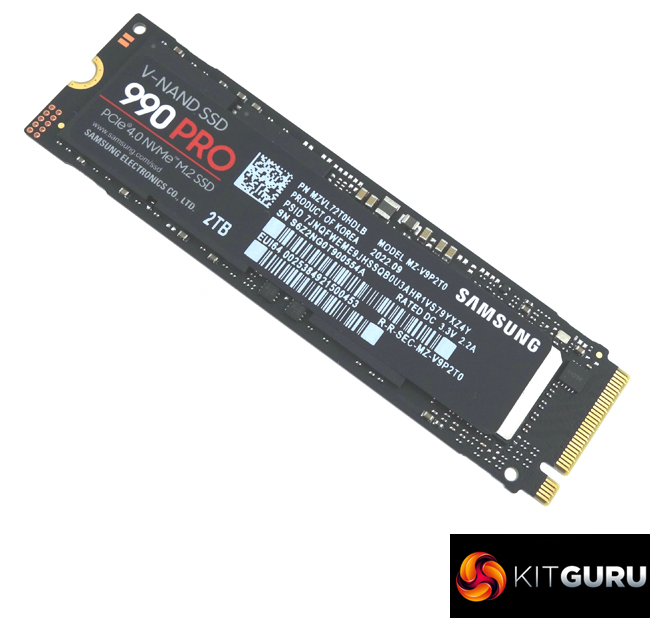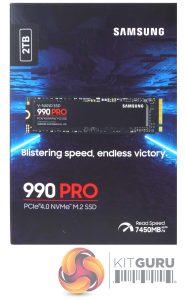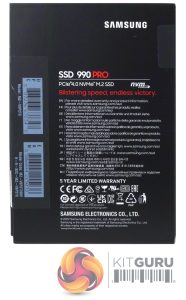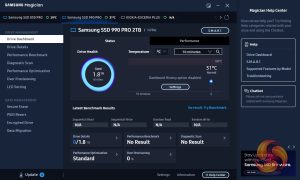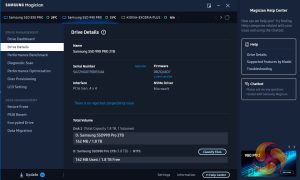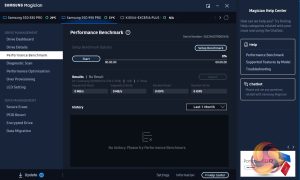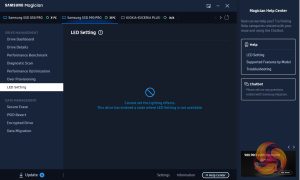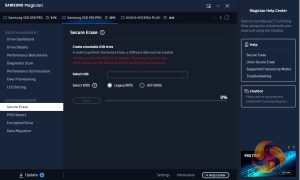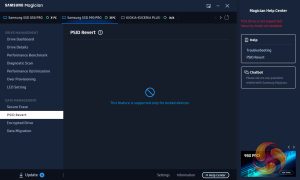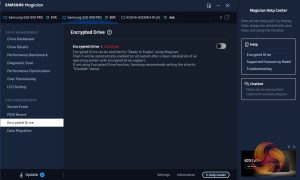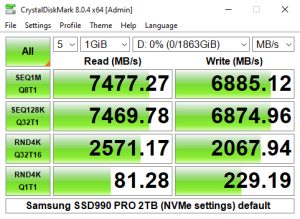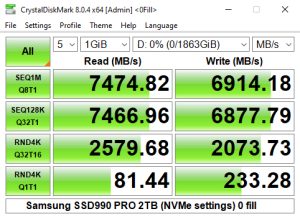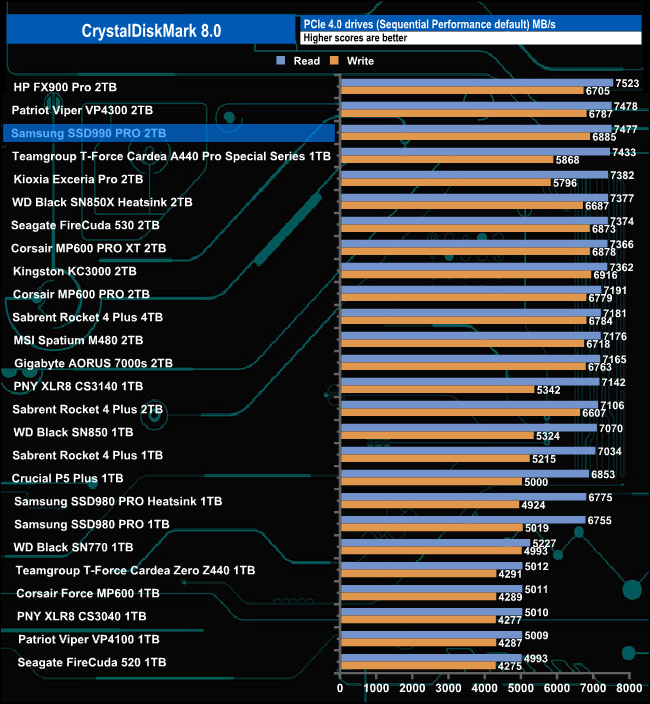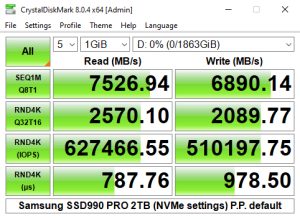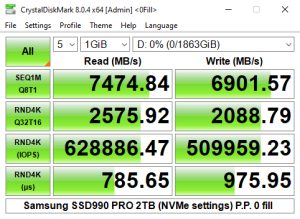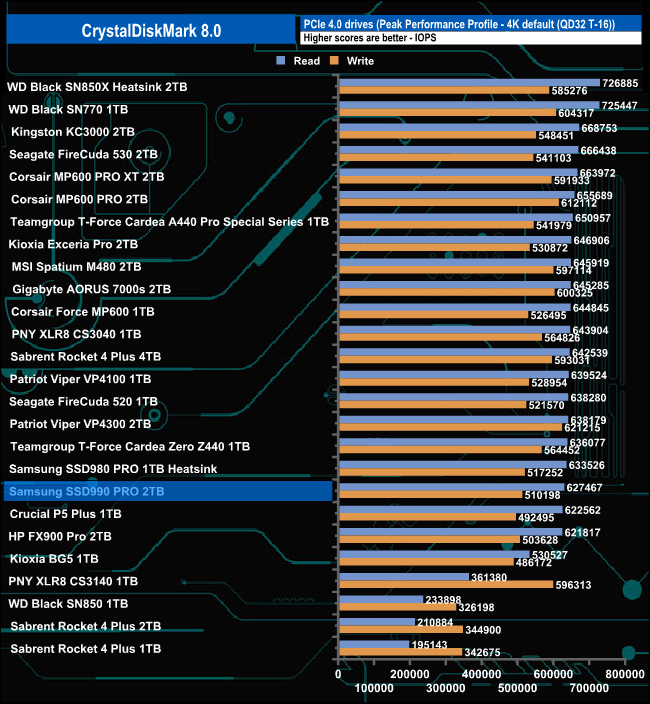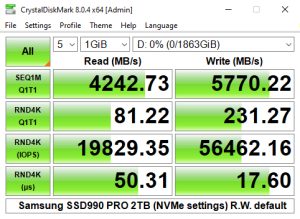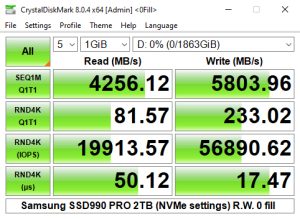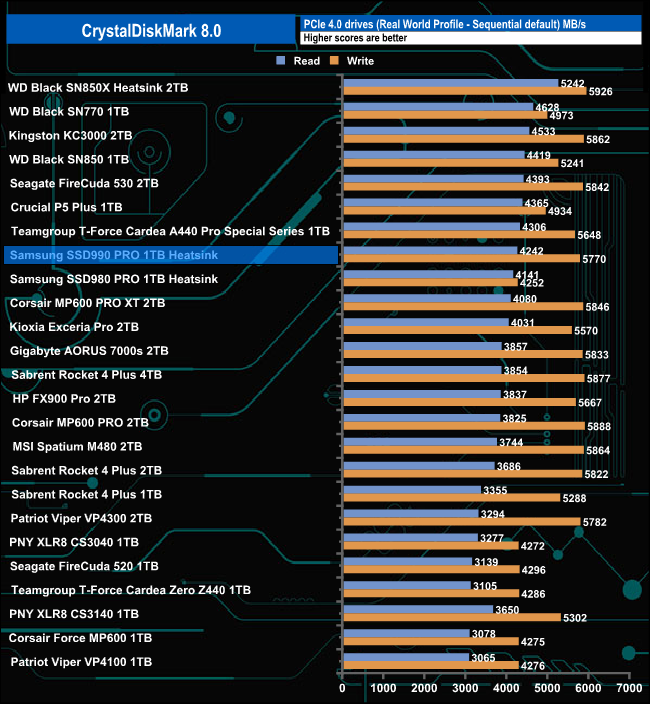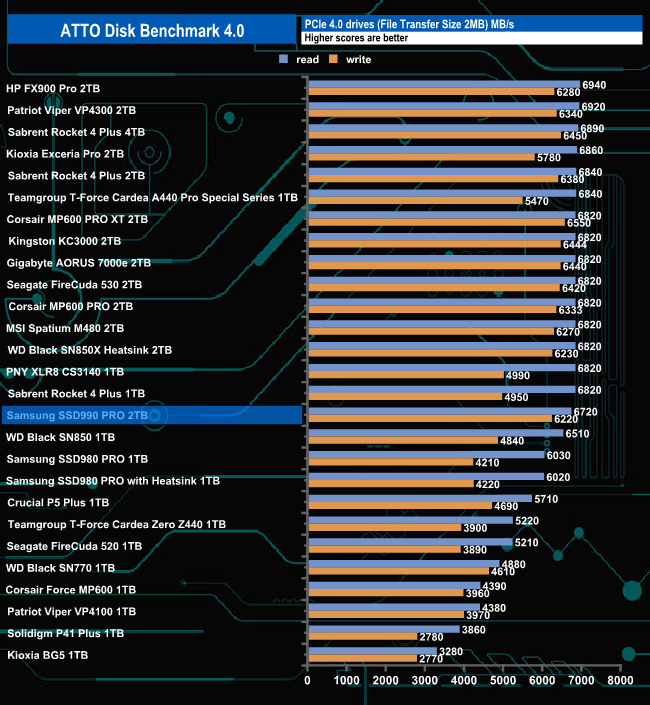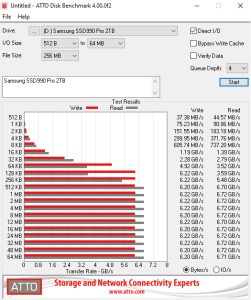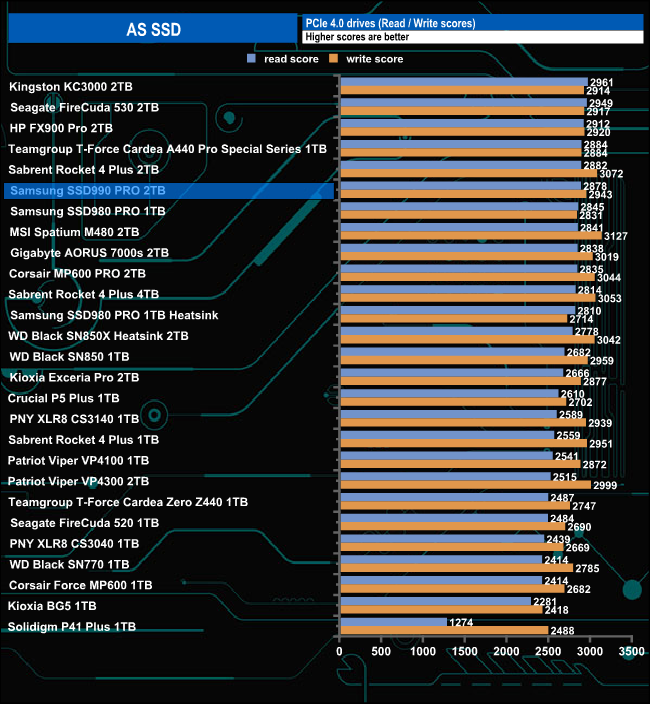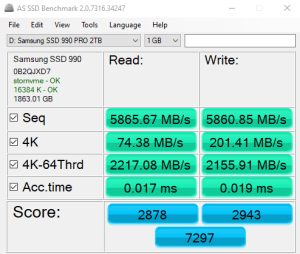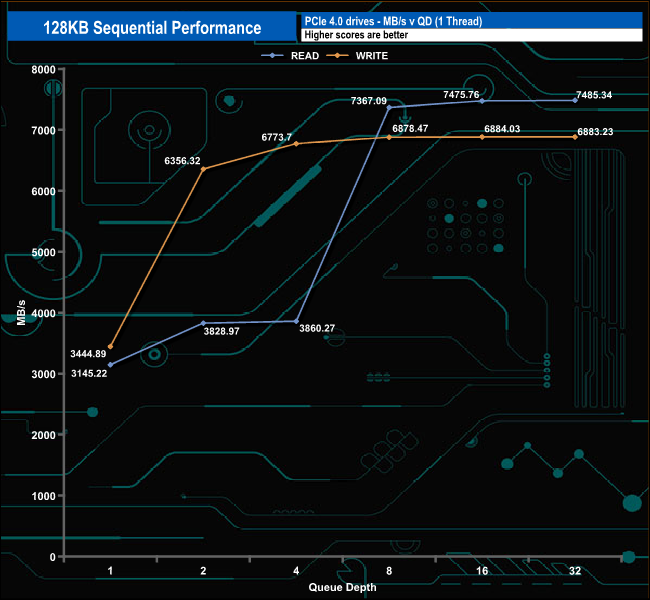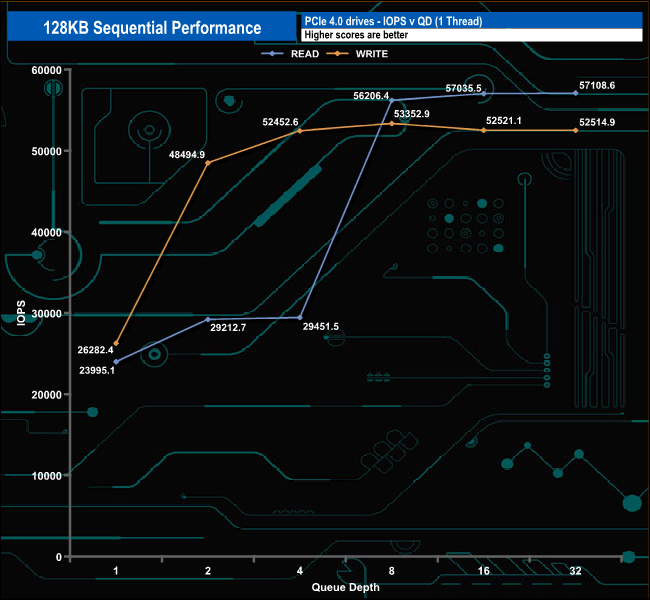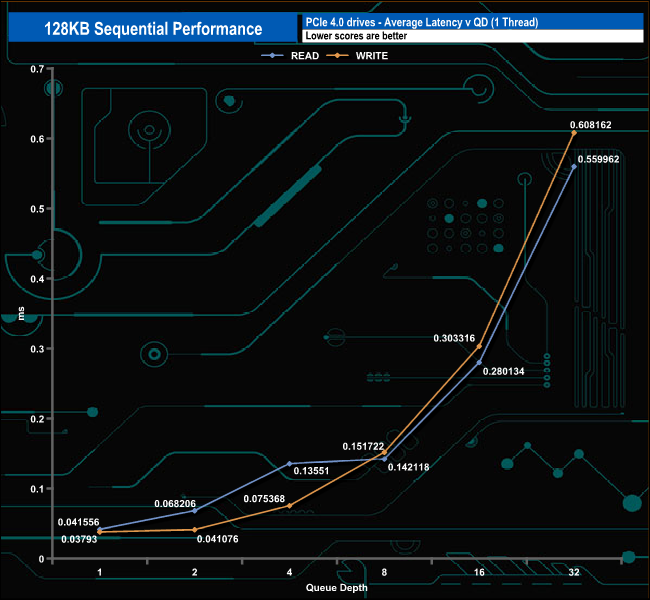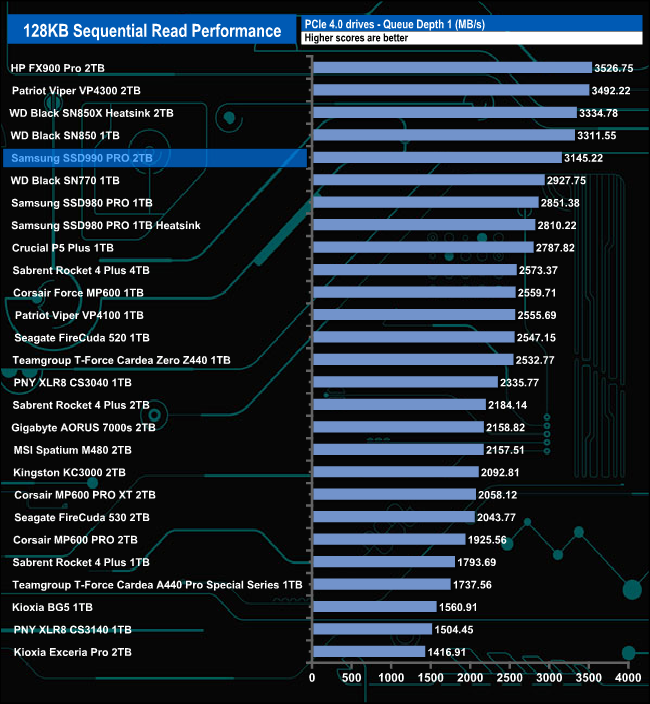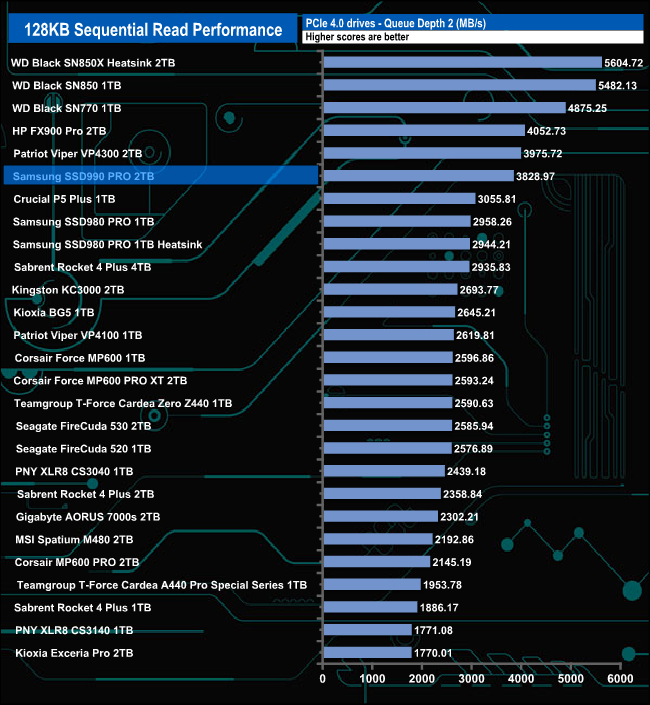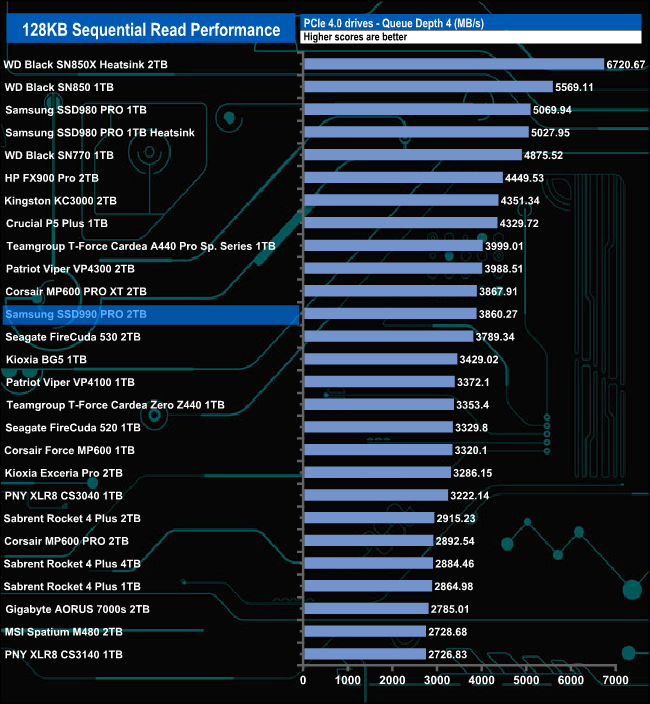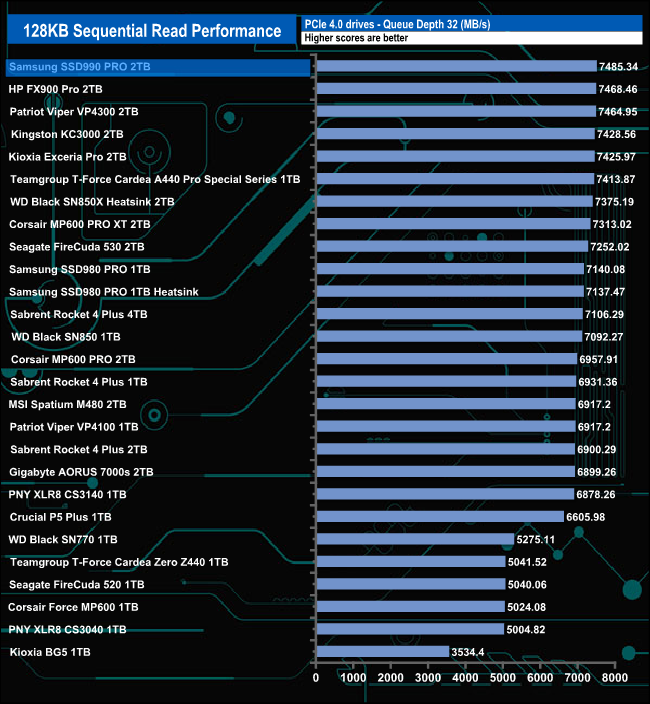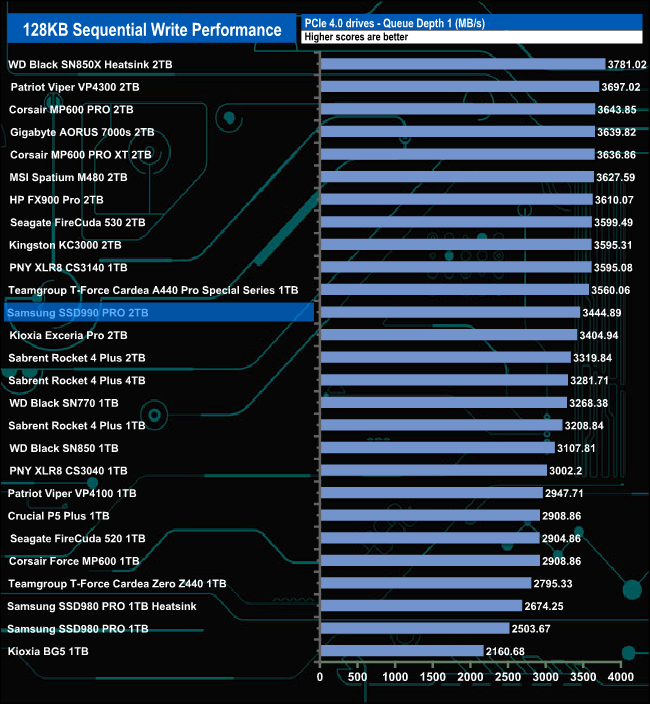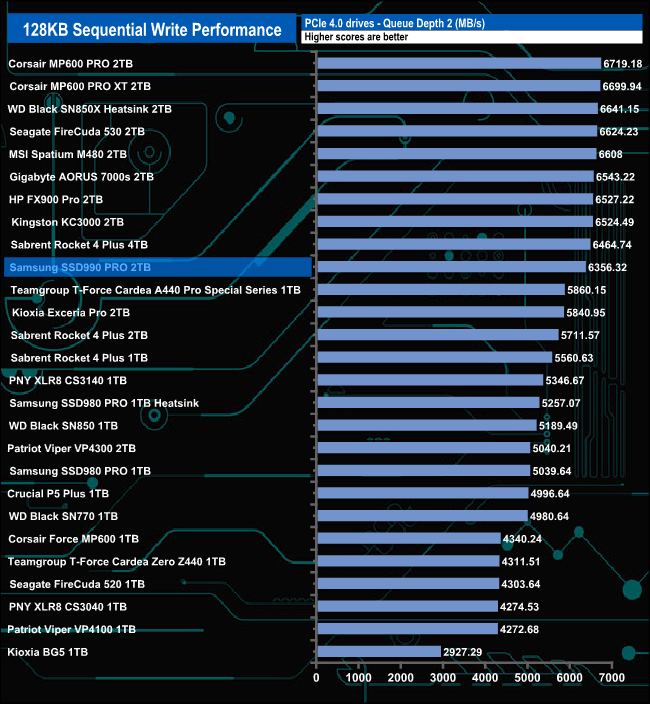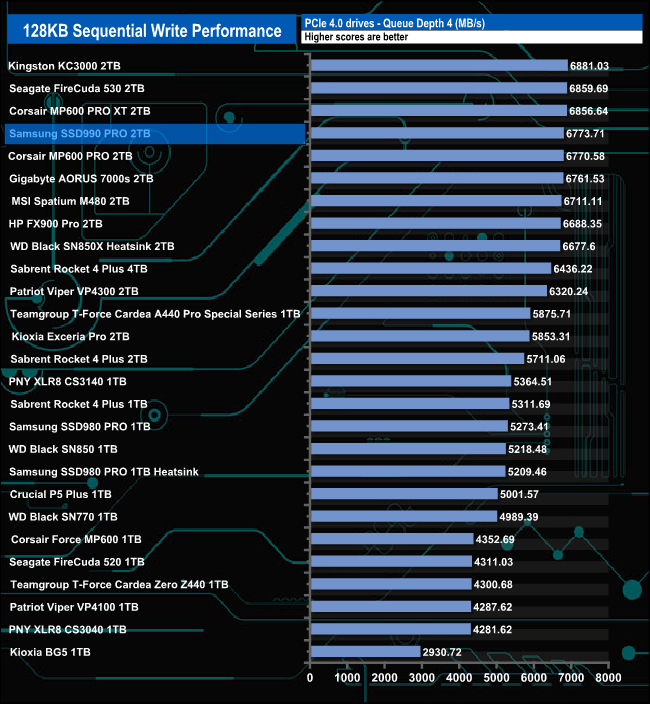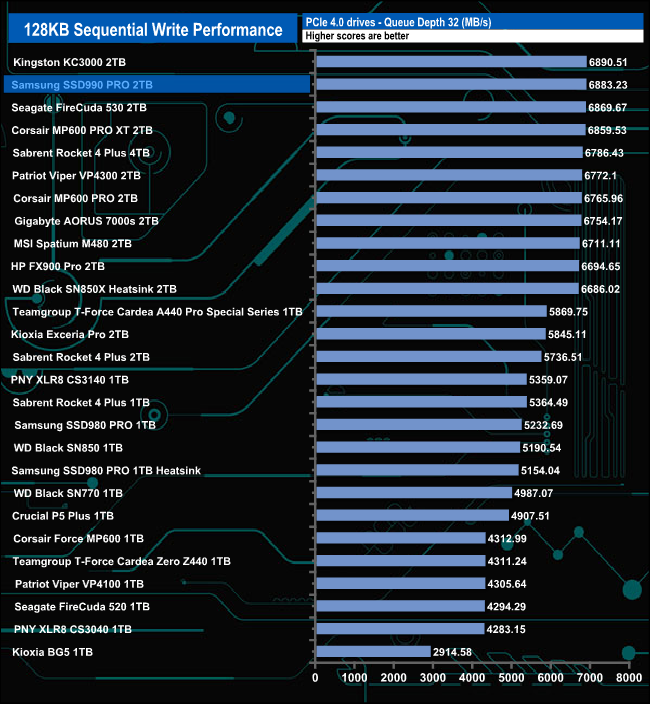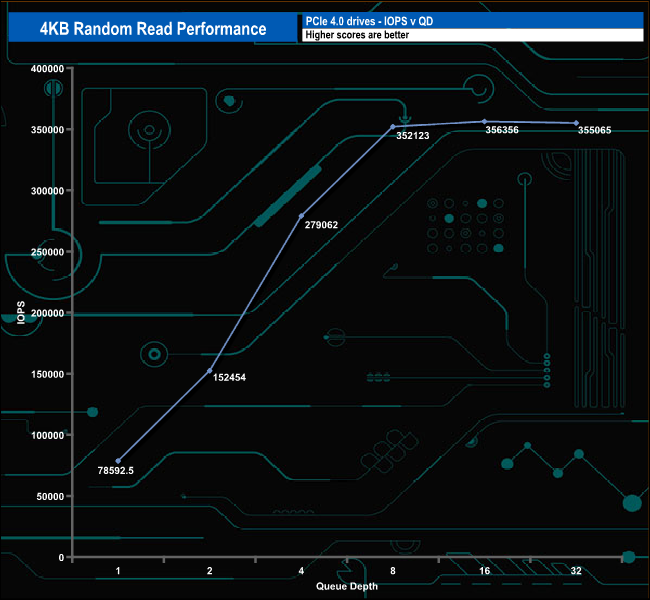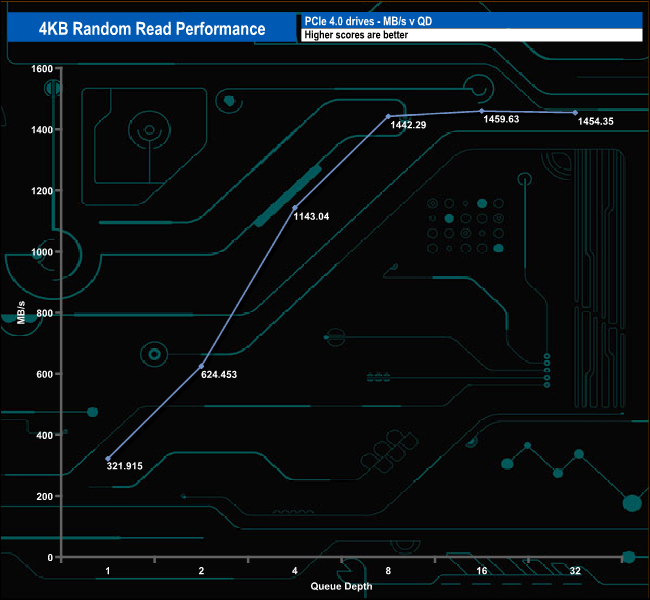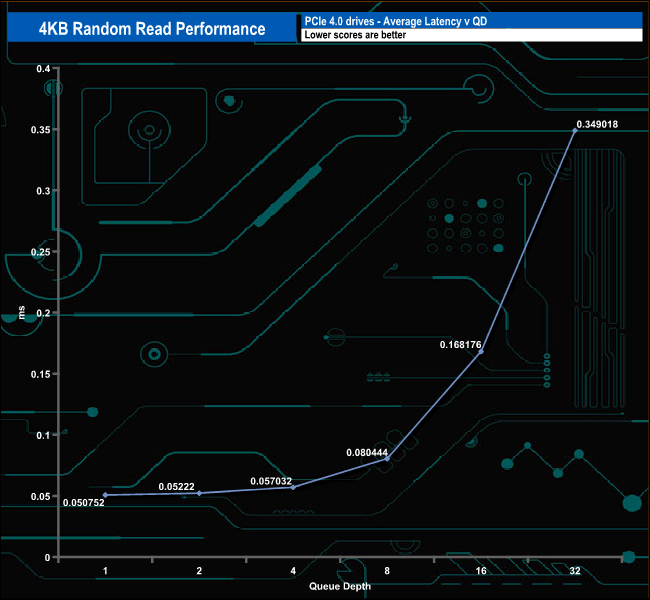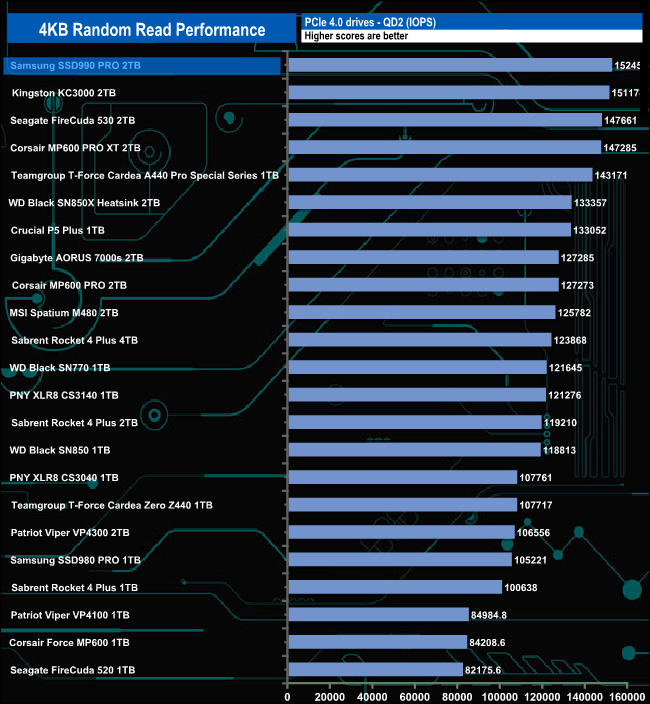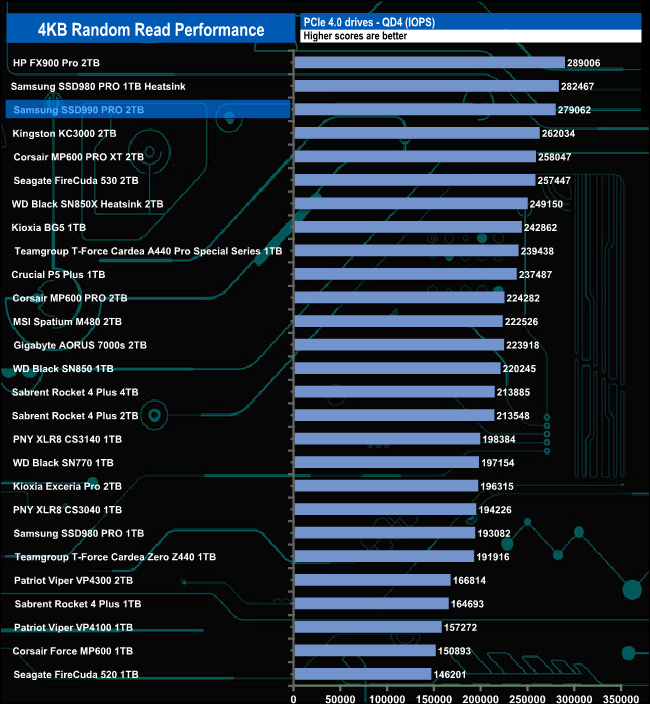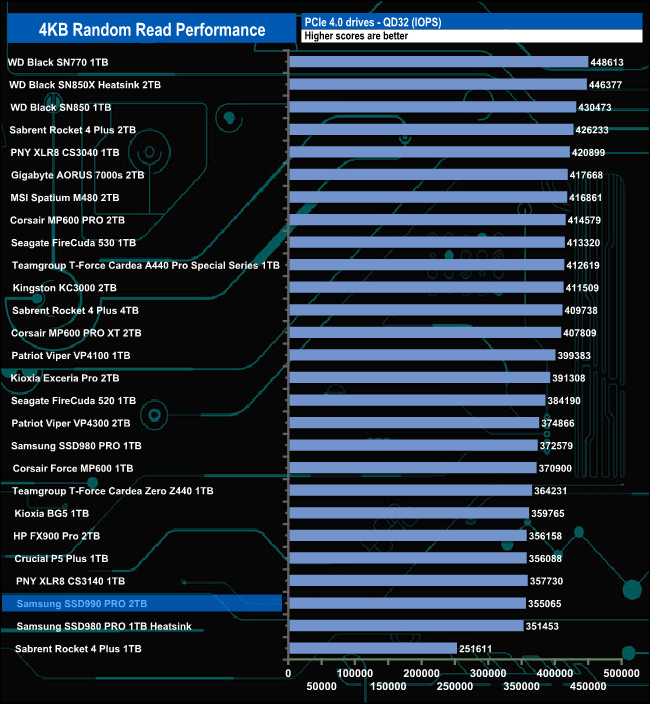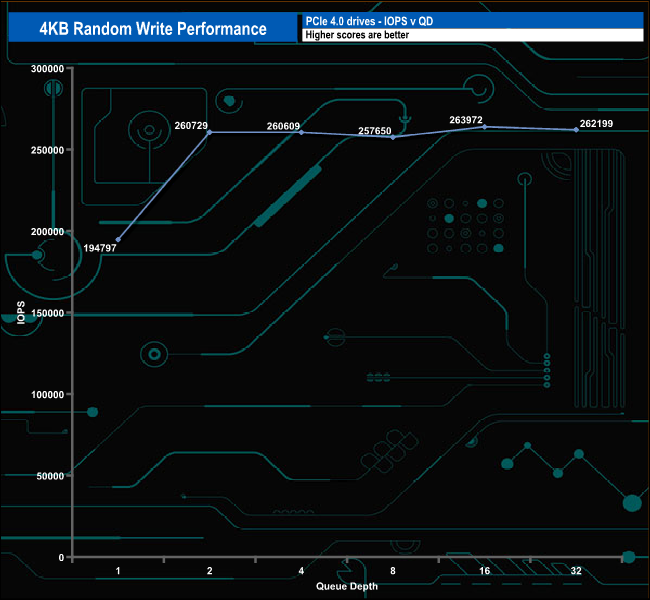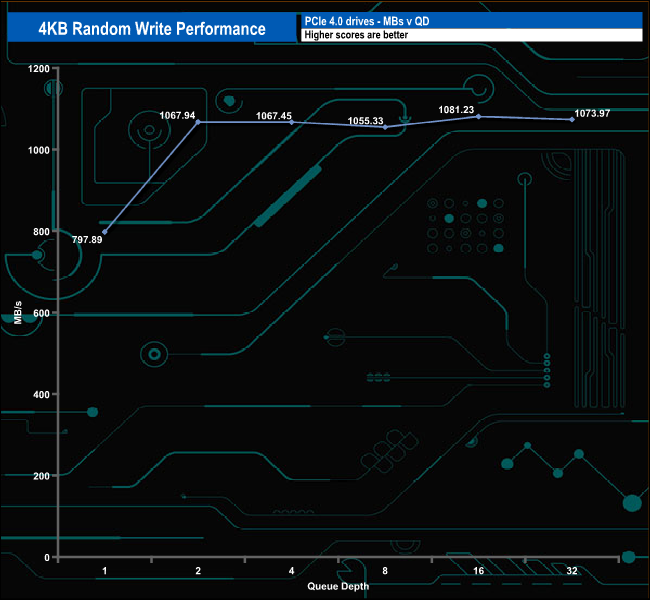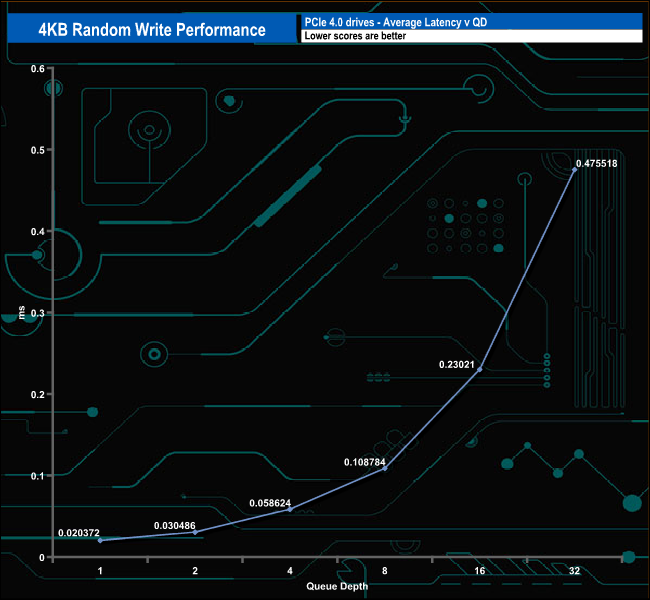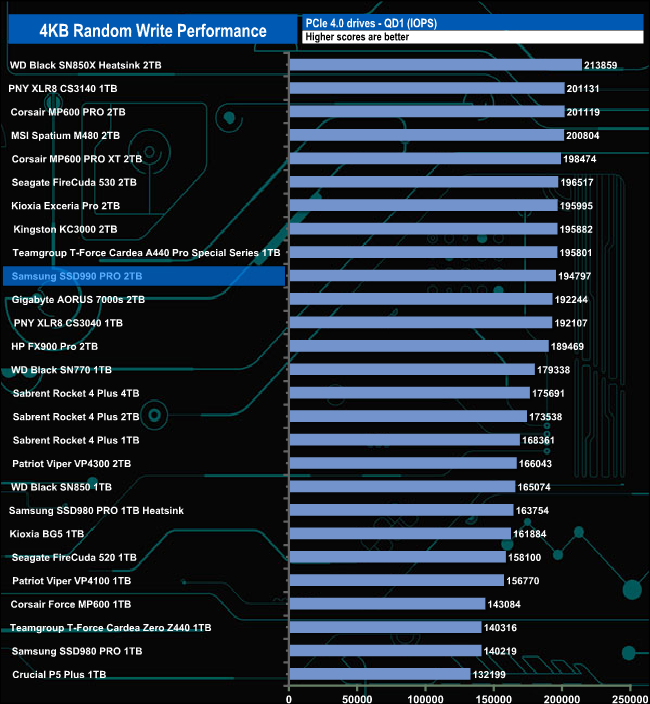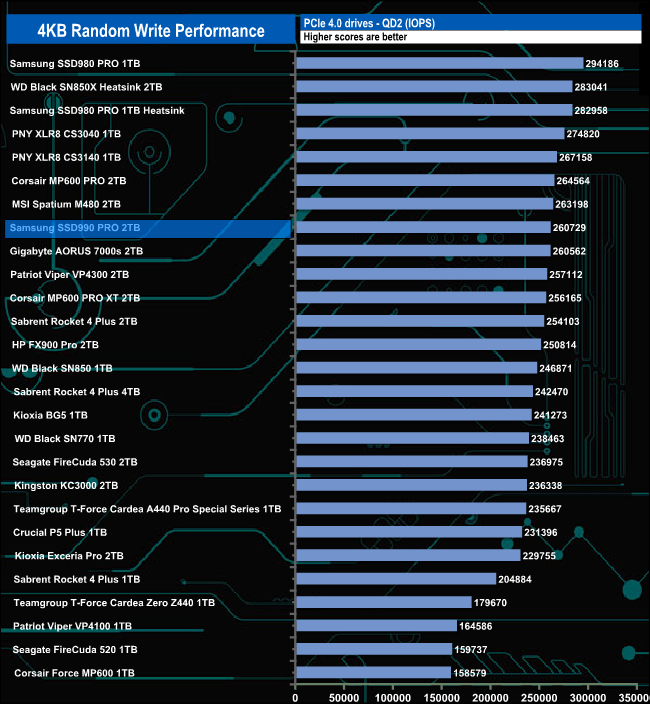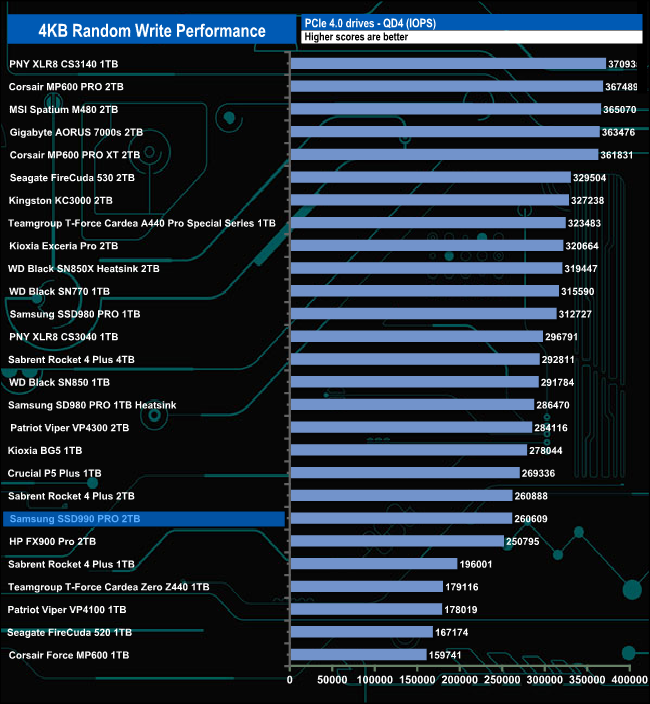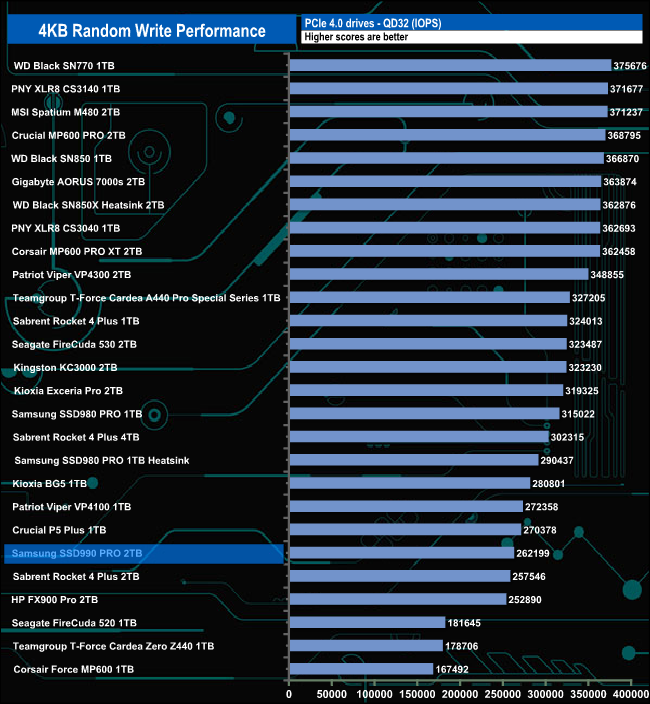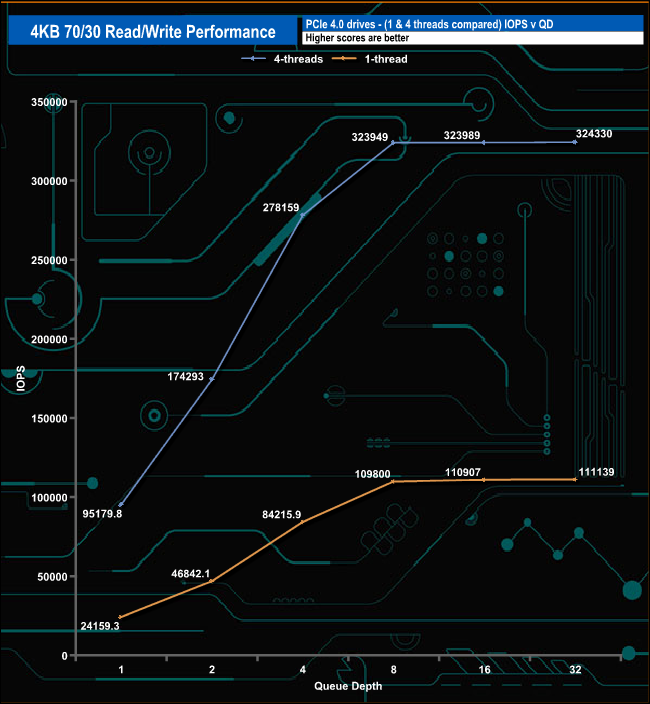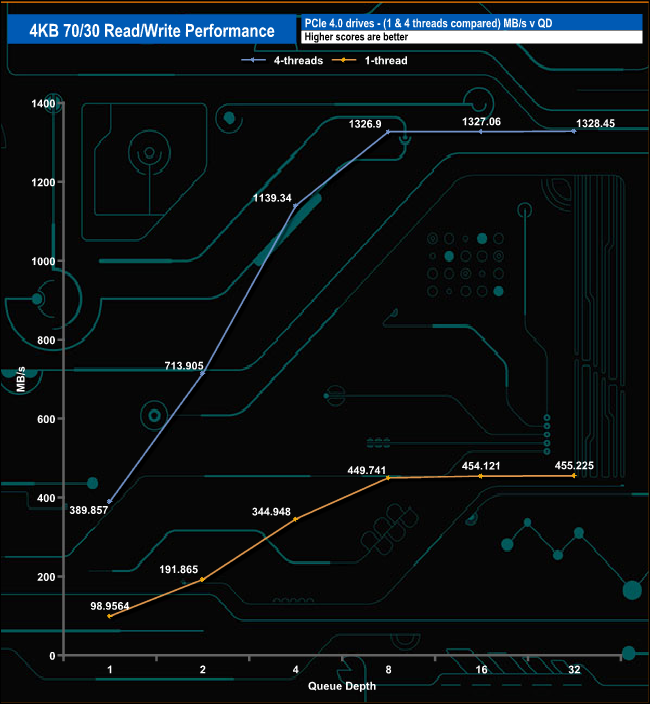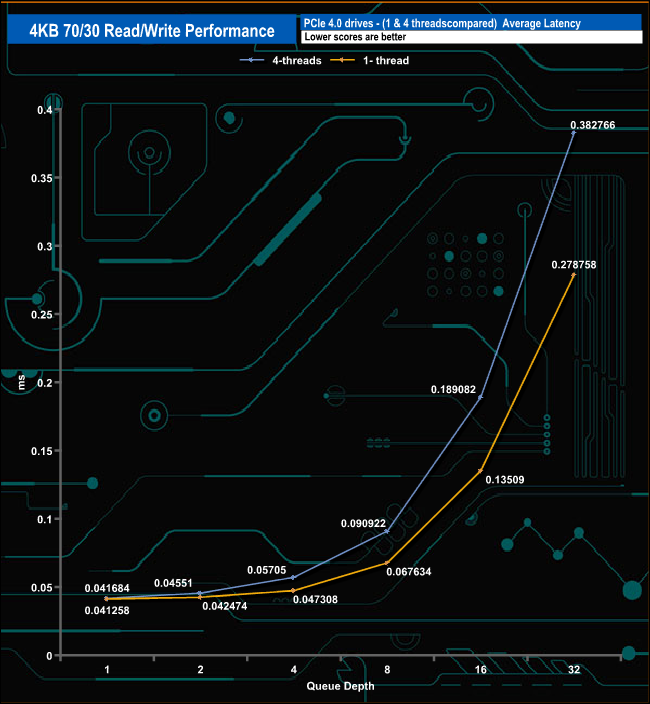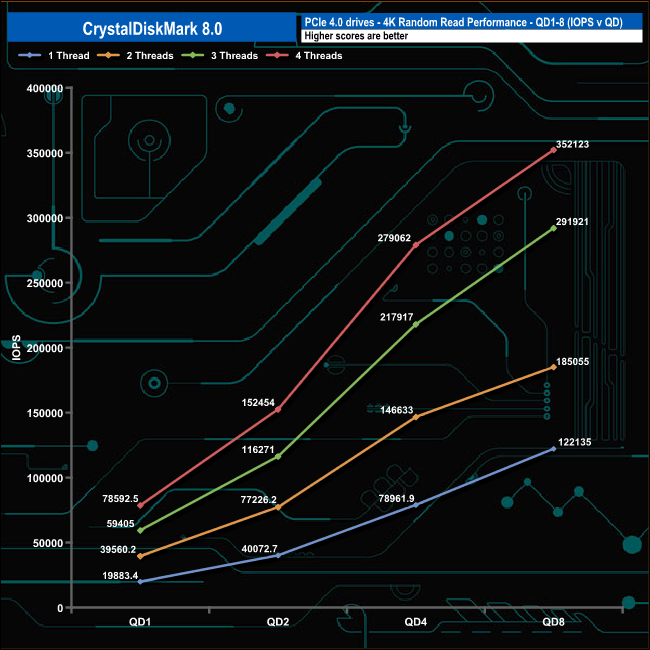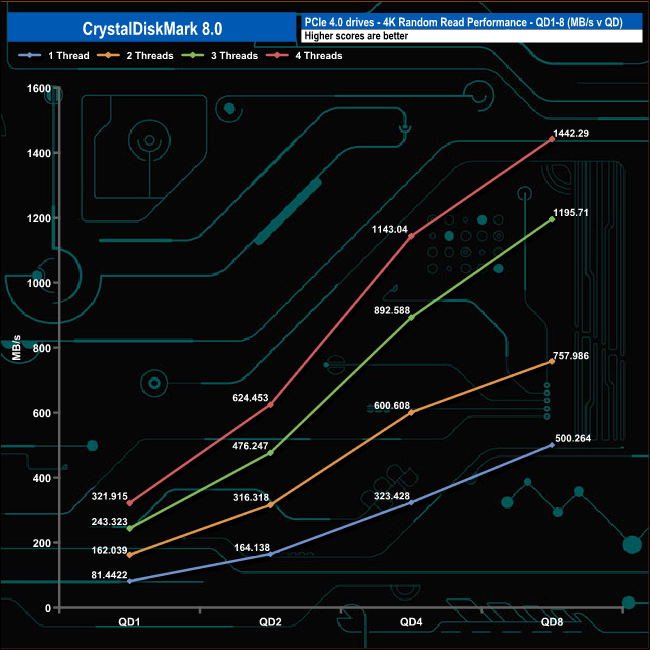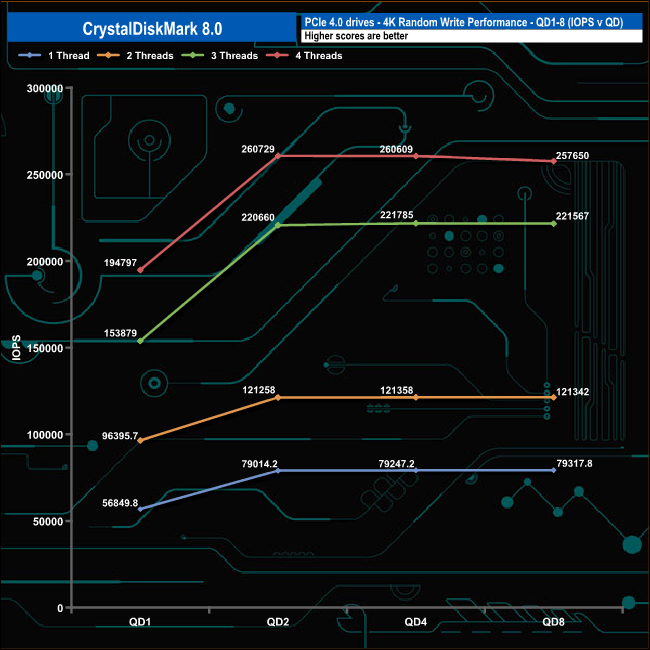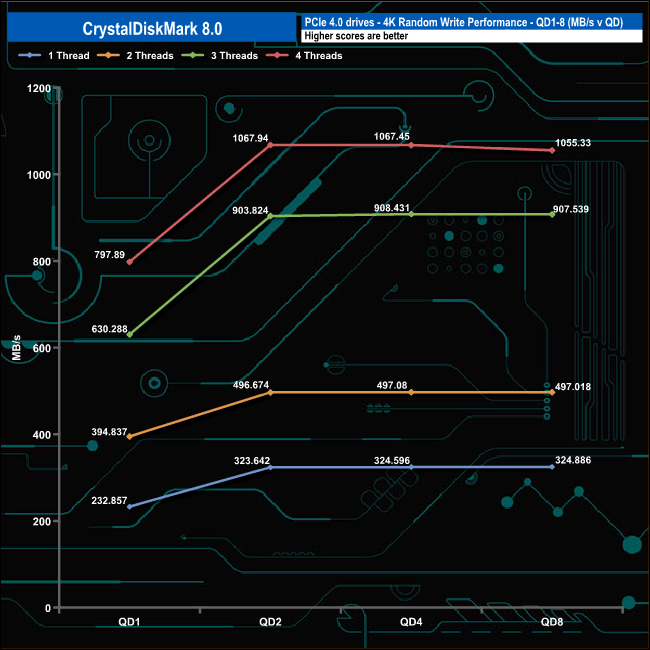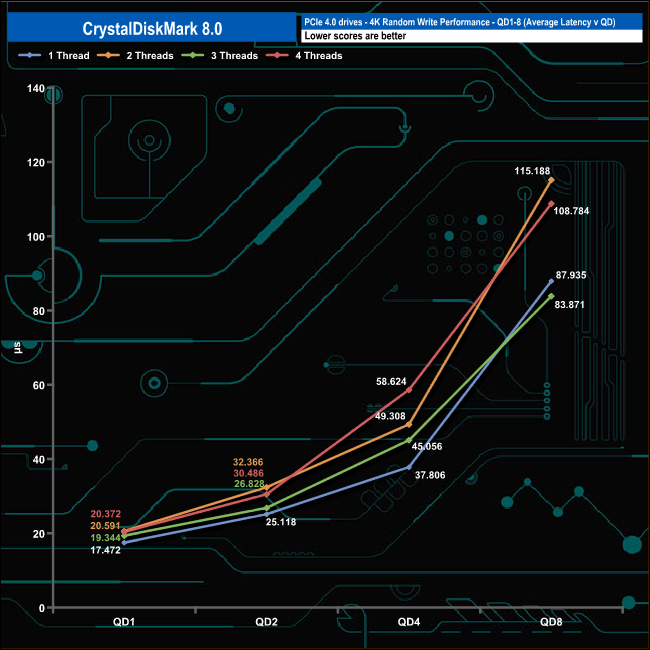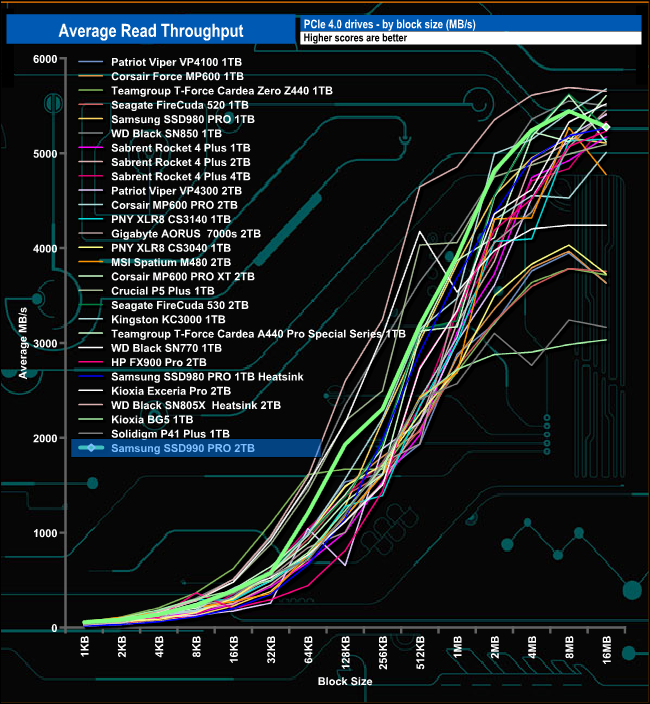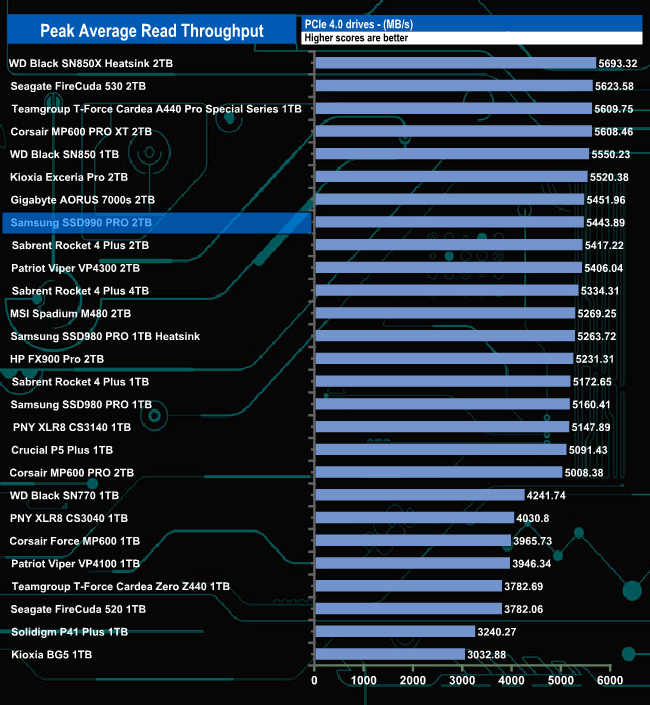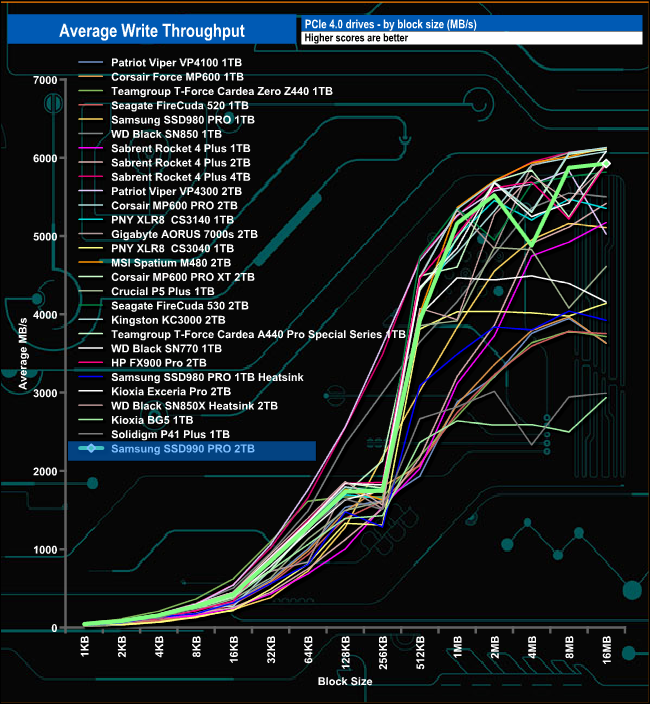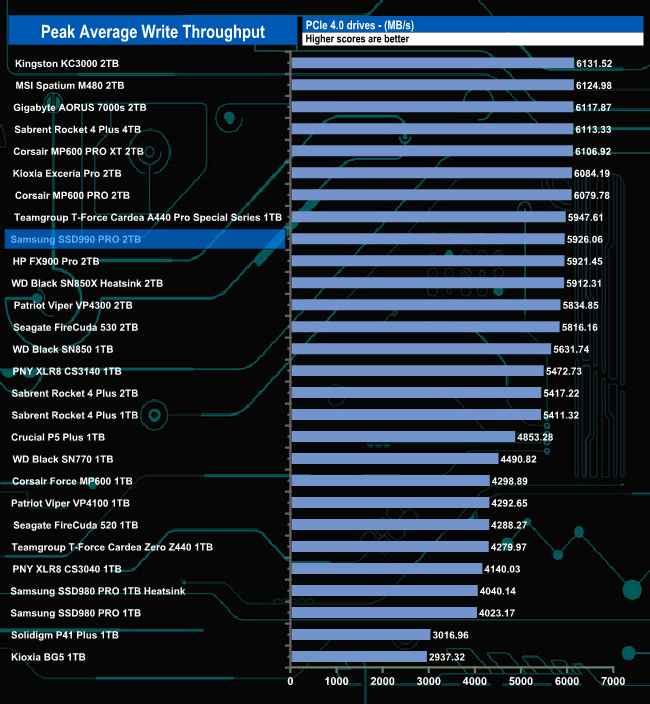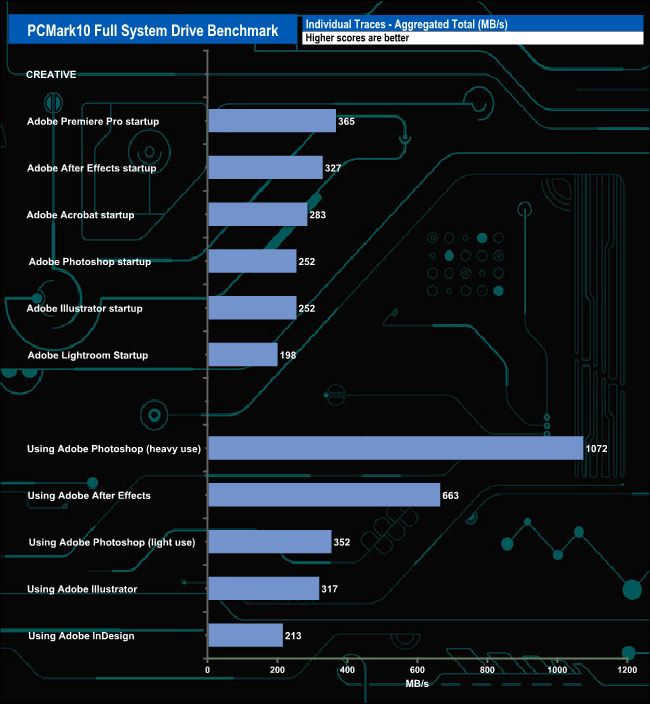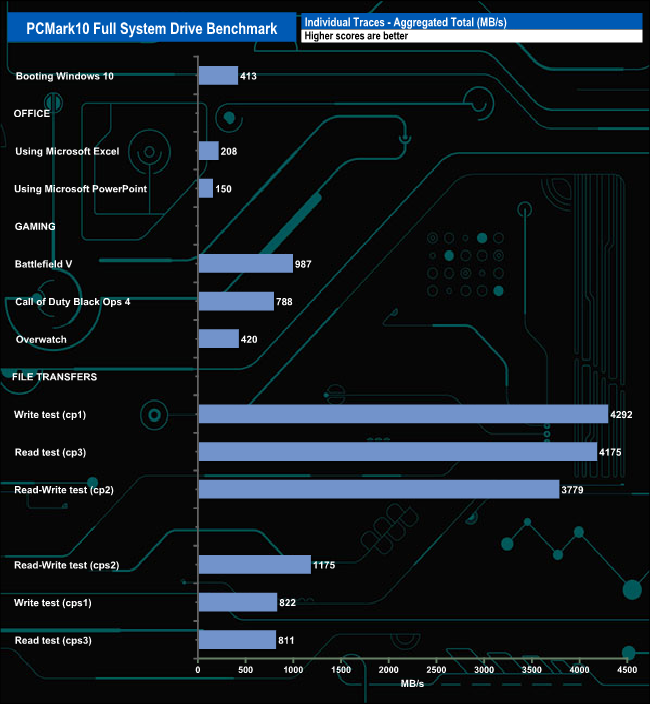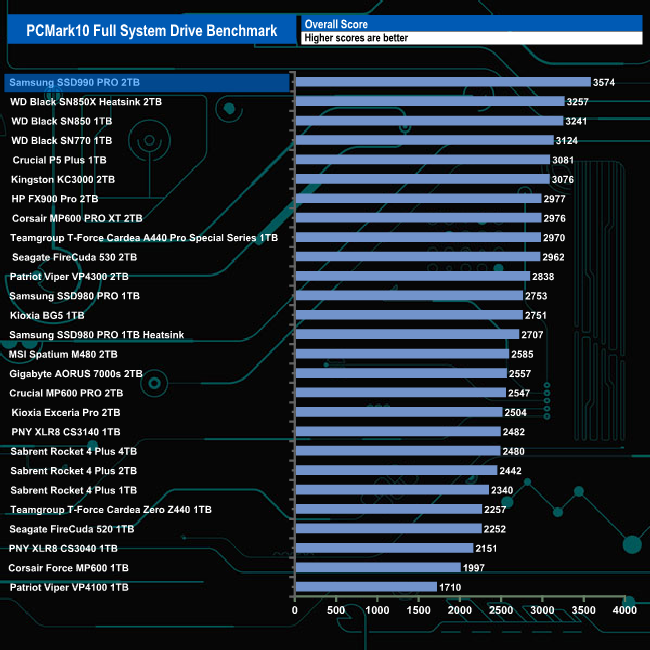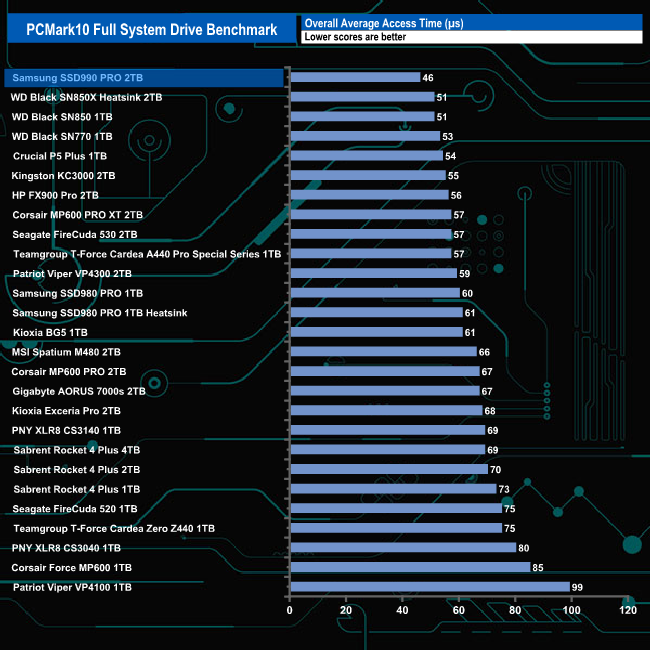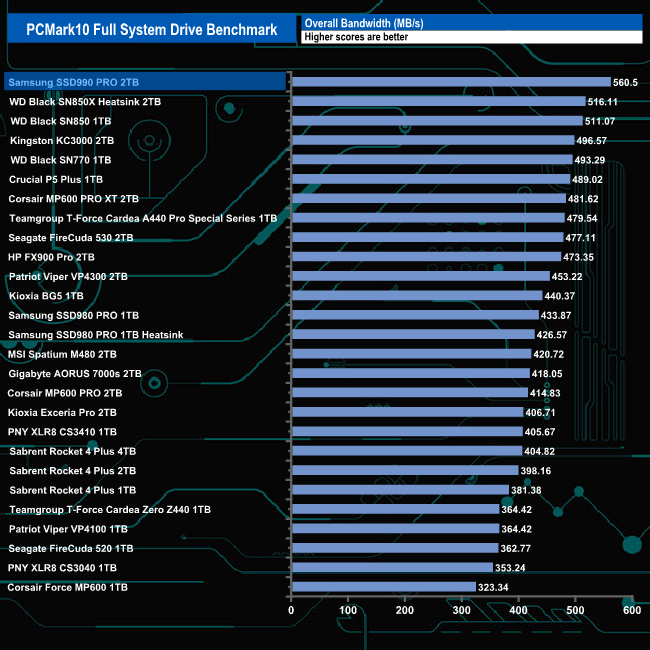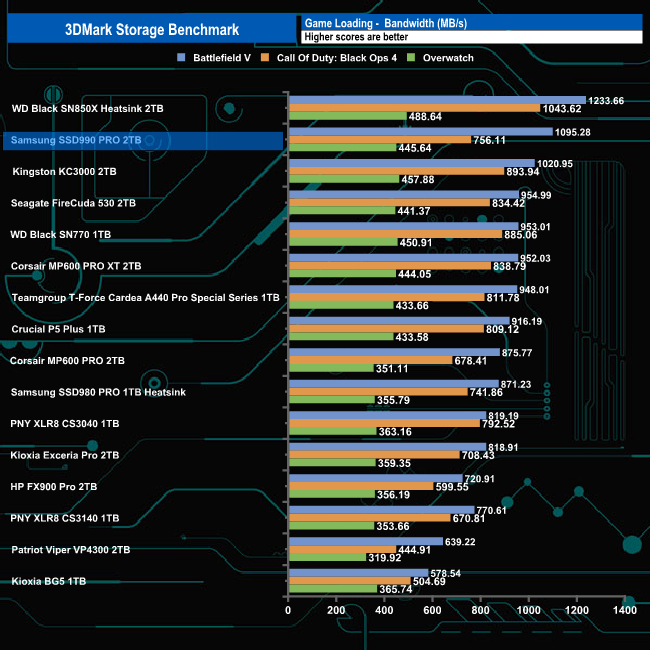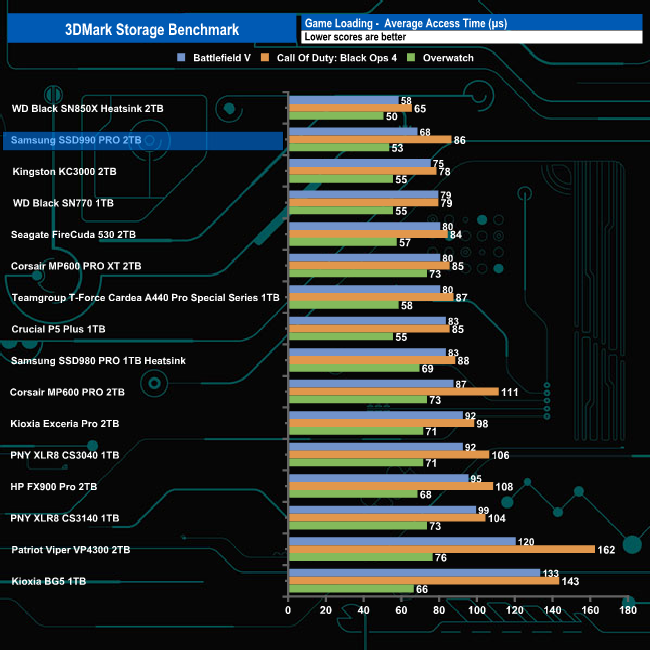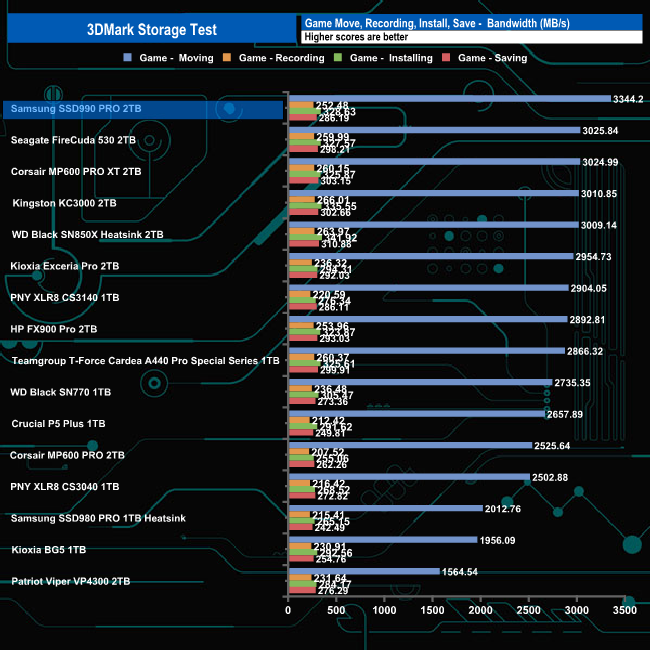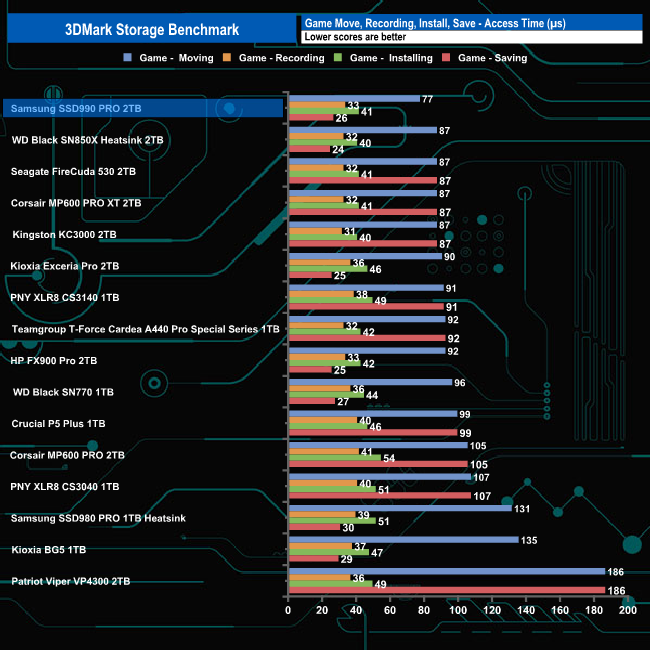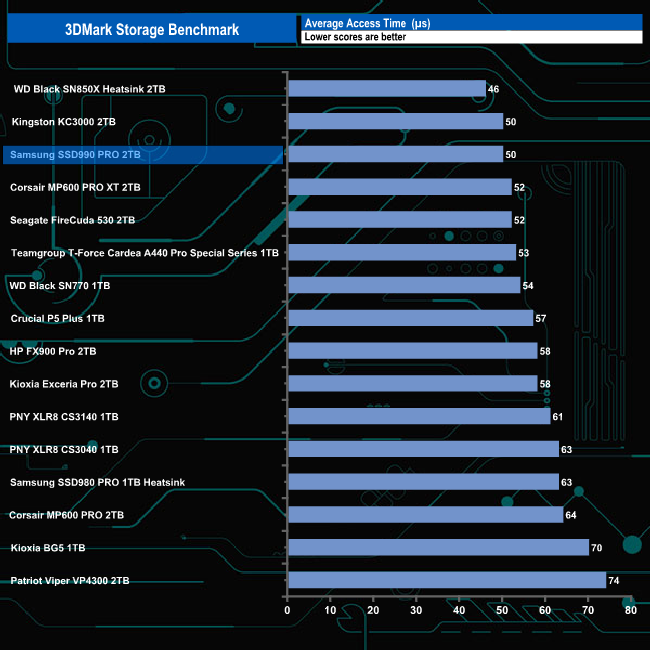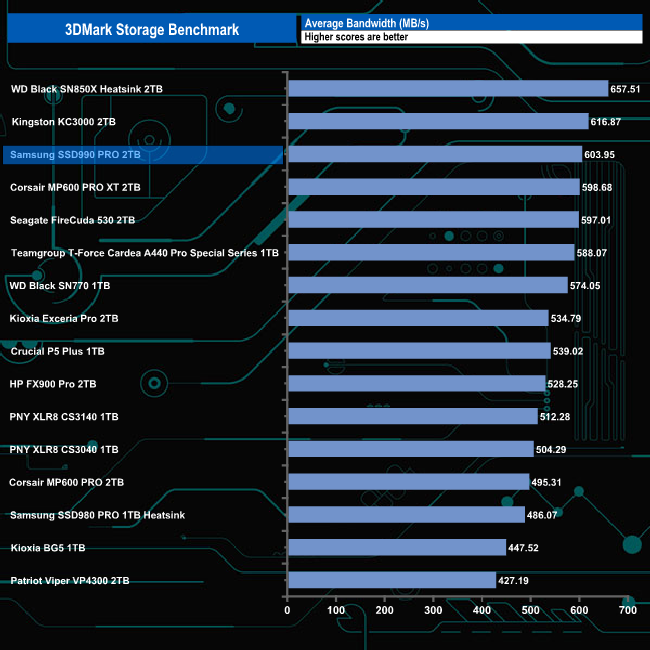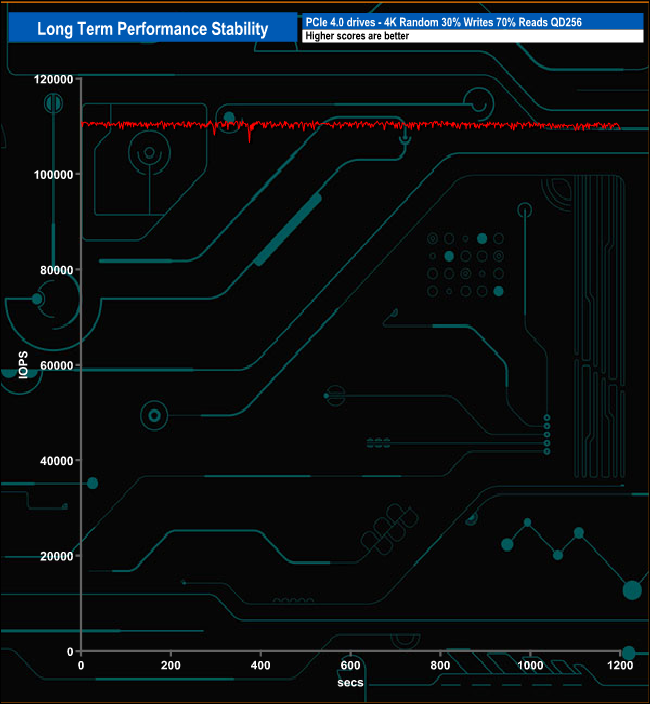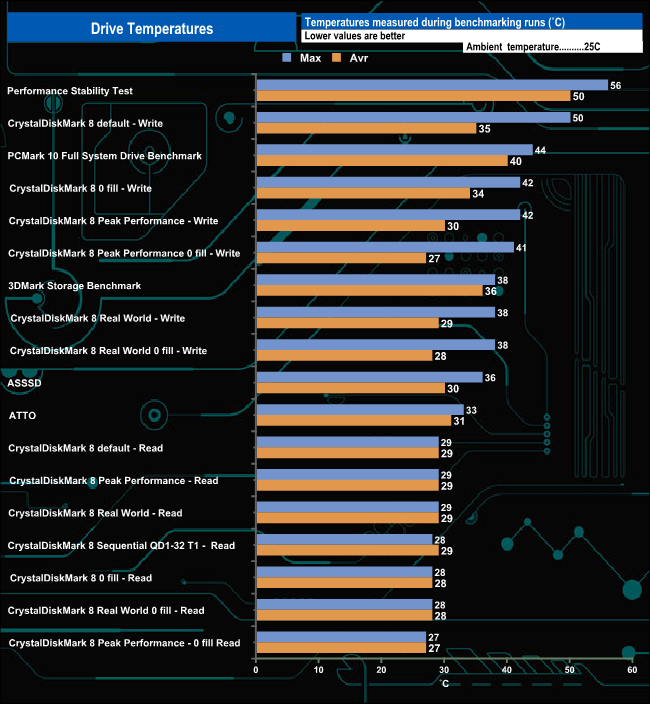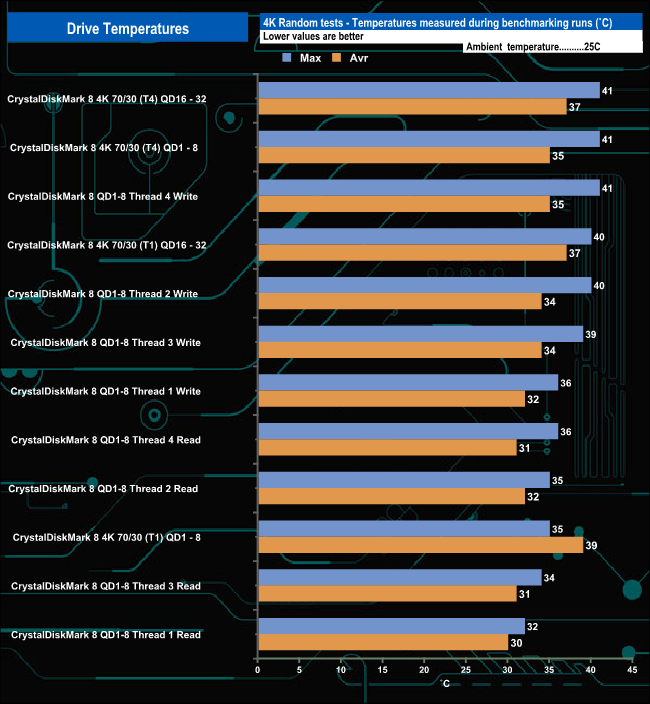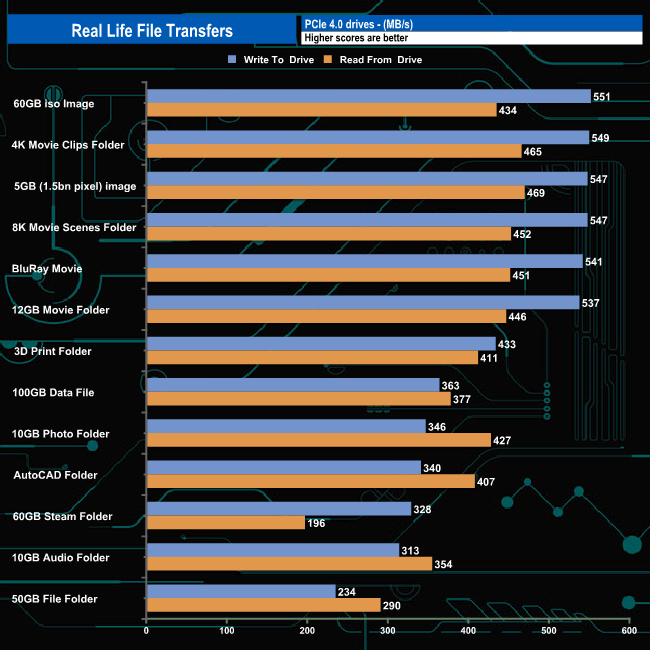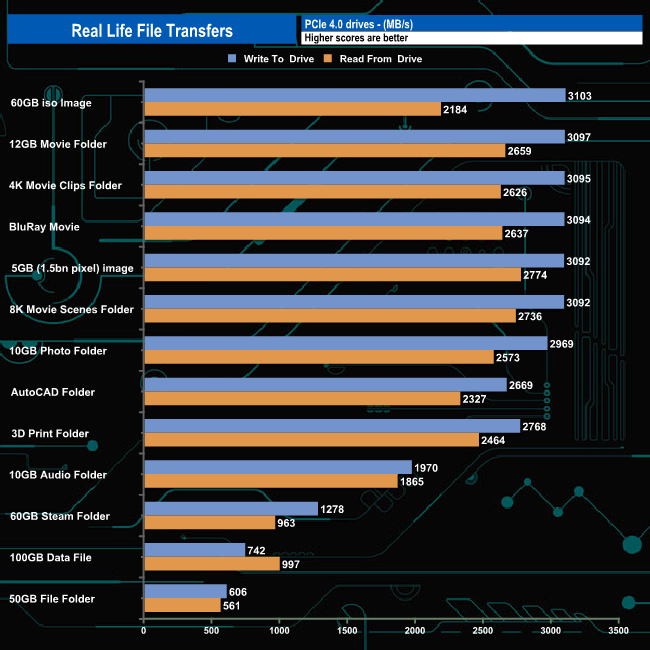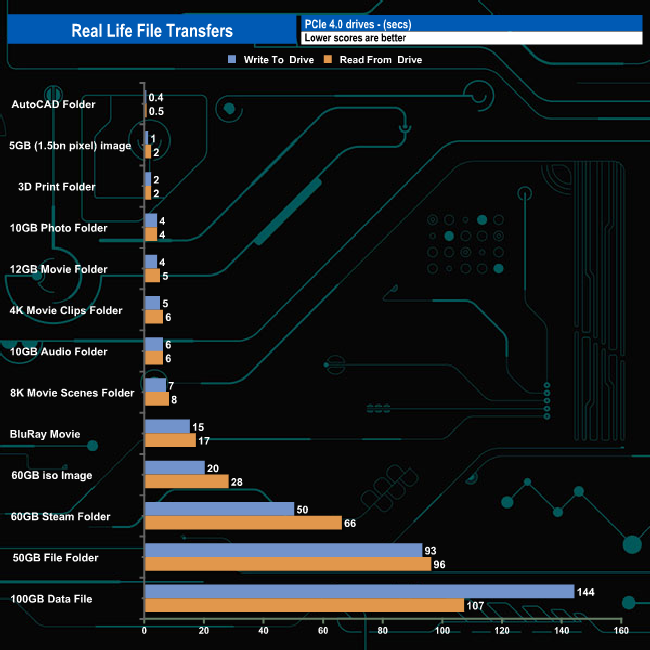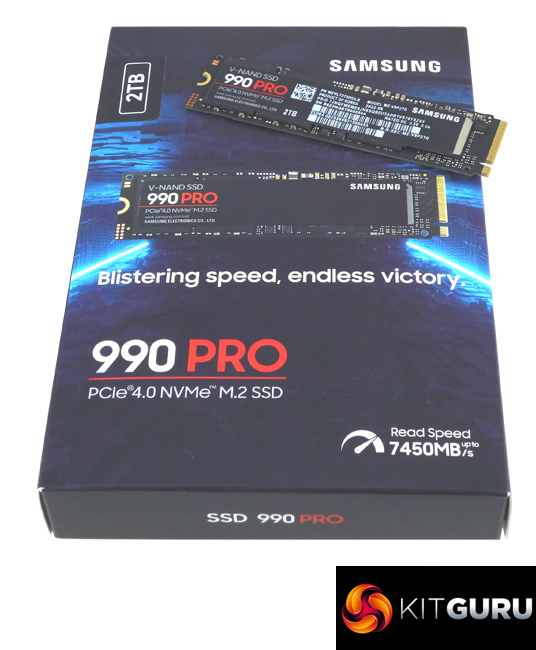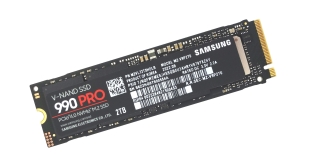
Samsung's latest flagship SSD for the consumer space is the 990 Pro, taking over from the previous high-end drive, the SSD 980 Pro. The new Gen 4 drive uses the latest in-house Pascal controller and Samsung's 7th generation V-NAND. Today we review the 2TB model, with an MSRP of £283.99.
At launch the 990 Pro comes in just two capacities; 1TB and 2TB and two versions, a plain drive or a heatsink-equipped model. A 4TB non-heatsink flagship model will be along sometime in 2023. The standard drive has a copper heat spreader built into the label on the back of the drive to help dissipate heat. The heatsink version of the drive gives more thermal control.
The drive uses a combination of Samsung's latest Pascal controller and the company's 176-layer 3-bit MLC (TLC) V-NAND. Sequential performance for the two capacities is quoted as up to 7,450MB/s for reads and up to 6,900MB/s for writes.
Samsung supplies two sets of 4K random read/write figures for the drive at Queue Depths 1 (1 thread) and 32 (16 threads). At QD1 the 2TB drive is rated up to 22.000 IOPS for reads and up to 80,000 IOPS for writes. At QD32 these figures rise to 1,550,000 IOPS for reads and up to 1,400,000 IOPS for writes. The 1TB drive has the same figures with the exception of the 4K write performance at QD32 where it is rated at 1,200,000 IOPS.
Power wise the 2TB drive is rated at 8.5W maximum and 5.5W average for active use. 55mW for idle and 5mw in sleep mode.
Samsung quotes endurance figures of 600TBW for the 1TB drive and 1,200TBW for the 2TB model and back the range with a 5-year warranty.
Physical Specifications:
- Usable Capacities: 2TB.
- NAND Components: Samsung 176-layer V-NAND.
- NAND Controller: Samsung Pascal.
- Cache: 2GB LPDDR4
- Interface: PCIe Gen 4.0 x4, NVMe 2.0.
- Form Factor: M.2, 2280.
- Dimensions: 80 x 22 x 2.3mm.
Firmware Version: 02BQJXD7.
Samsung’s 990 Pro comes in a black box with a good clear image of the drive on the front. On the top left-hand side of the box, we find a sticker displaying the drive’s 2TB capacity. Also displayed is the drive's 7,450MB/s Sequential read speed. The rear of the box has a multilingual information panel giving the web address for more detailed warranty information. Under this is a reminder that the drive has a 5-year limited warranty.
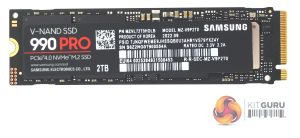
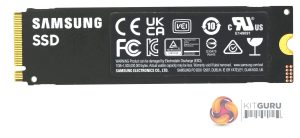
The 2TB 990 Pro is built on a single-sided M.2 2280 format. The Product sticker on the rear of the drive has a built-in copper layer to help get rid of some of the heat generated by the drive when working.
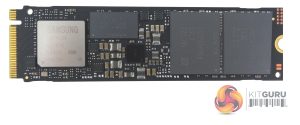
Under the long Product label on the front of the drive sits Samsung's new Pascal controller along with two packages of Samsung’s 7th generation 176-layer 3-bit MLC (TLC) V-NAND (coded K9DVGY8JRD-DCK0) which uses 512Gb dies and a 2GB LPDDR4 cache IC.
Built on an 8nm Process, the Pascal controller takes over from the Elpis controller that powered the previous generation SSD 980 Pro. The controller has a nickel coating which together with the heat spreader label on the back of the drive and Samsung’s Dynamic Thermal Guard Technology help with heat dissipation, keeping the 990 Pro at optimal temperatures during heavy usage.
Samsung’s SSD management utility goes by the name of Magician and can be downloaded from Samsung’s website. The latest v7.2 version brings support for the 990 Pro. Magician allows you to do most maintenance jobs you may need to do with an SSD and lists them under two headings; Drive Management and Data Management.
Drive Management Provides drive information, a performance benchmark, diagnostic scans, performance optimisation, Over Provisioning and Provides a page for the LED settings for the heatsink version of the drive
Data Management Provides tools for secure erase, PSID revert, data encryption (the drive supports AES 256-bit full-disk encryption, TCG/Opal V2.0, and Encrypted Drive -IEEE1667 (MS eDrive ) and data migration.
For testing, the drives are all wiped and reset to factory settings by HDDerase V4. We try to use free or easily available Programs and some real-world testing so you can compare our findings against your own system. This is a good way to measure potential upgrade benefits.
Main system:
AMD Ryzen 5 3600X, 16GB DDR4-2400, Sapphire R9 390 Nitro and an MSI MPG X570 Gaming Edge Wifi motherboard
Other drives:
Corsair MP600 Pro 2TB
Corsair Force MP600 1TB
Corsair MP600 Pro XT 2TB
Crucial P5 Plus 1TB
Gigabyte AORUS 7000e 2TB
HP FX900 Pro 2TB
Kingston KC3000 2TB
Kioxia BG5 1TB
Kioxia Exceria Pro 2TB
MSI Spatium M480 2TB
Patriot Viper VP4300 2TB
Patriot Viper VPN4100 1TB
PNY XLR8 CS3040 1TB
PNY XLR8 CS3140 1TB
Sabrent Rocket 4 Plus 1TB
Sabrent Rocket 4 Plus 2TB
Sabrent Rocket 4 Plus 4TB
Samsung 980 Pro 1TB
Samsung 980 Pro Heatsink 1TB
Seagate FireCuda 520 1TB
Seagate FireCuda 530 2TB
Teamgroup T-Force Cardea Zero Z440 1TB
Teamgroup T-Force Cardea A440 Pro Special Series 1TB
WD Black SN770 1TB
WD Black SN850 1TB
WD Black SN850X Heatsink 2TB
Software:
Atto Disk Benchmark 4.
CrystalMark 7.0.0.
AS SSD 2.0.
IOMeter.
UL Solutions PC Mark 10.
UL Solutions 3DMark Storage Benchmark
All our results were achieved by running each test five times with every configuration this ensures that any glitches are removed from the results. Trim is confirmed as running by typing fsutil behavior query disabledeletenotify into the command line. A response of disabledeletenotify =0 confirms TRIM is active.
CrystalDiskMark is a useful benchmark to measure the theoretical performance levels of hard drives and SSDs. We are using v8.0.
In the CrystalDiskMark 4K QD1 test, the 990 Pro has a slightly slower read performance than the heatsink version of the previous generation SSD 980 Pro but a better write performance than the older drive.
With the CrystalDiskMark 8 default test, we could confirm the official Sequential performance figure of 7,450MB/s with a test result of 7,477MB/s but came up just shy of the official 6,900MB/s maximum write figure at 6,885MB/s.
Using CrystalDiskMark 8's Peak Performance Profile we could confirm both official read/write Sequential figures. The tested read figure of 7,256MB/s saw the drive in the top spot on our results chart although the write performance wasn't quite as strong.
When it came to tested 4K performance our results scores came nowhere close to the official maximums. Samsung rate the 2TB 990 Pro at up to 1,550,000 IOPS for reads and up to 1,400,000 IOPS for writes. The best we saw using the default Peak Performance Profile was 627,466 IOPS for reads and 510,197 IOPS for writes.
Using the Real World Profile benchmark, the drive landed in the top ten of drives we've tested with a read result of 4,242MB/s with writes doing better at 5,770MB/s.
The ATTO Disk Benchmark performance measurement tool is compatible with Microsoft Windows. Measure your storage systems performance with various transfer sizes and test lengths for reads and writes. Several options are available to customize your performance measurement including queue depth, overlapped I/O and even a comparison mode with the option to run continuously.
Use ATTO Disk Benchmark to test any manufacturer's RAID controllers, storage controllers, host adapters, hard drives and SSD drives and notice that ATTO Products will consistently Provide the highest level of performance to your storage.
We are using version 4.0 for our NVMe disk tests.
Using the ATTO benchmark we fell short of the official maximum Sequential read/write scores of up to 7,450MB/s and up to 6,900MB/s respectively for the drive. Even though the drive didn't reach the official maximums, it's still a good deal quicker than both models of the previous generation SSD 980 Pro.
AS SSD is a great free tool designed just for benching Solid State Drives. It performs an array of sequential read-and-write tests, as well as random read-and-write tests with sequential access times over a portion of the drive. AS SSD includes a sub suite of benchmarks with various file pattern algorithms but this is difficult in trying to judge accurate performance figures.
In the AS-SSD benchmark test, the 990 Pro's read score was just enough to see it above the 980 Pro in our results chart. However, its write score of 2943 was some 112 points better than the previous generation drive.
We used CrystalDiskMark 8‘s custom settings to test the Sequential read and write performance of the drive through a range of queue depths. The setup for the tests is listed below.
128KB Sequential Read / Write.
Transfer Request Size: 128KB, Thread(s): 1, Outstanding I/O: 1-32.
In our own Sequential tests could confirm the official read/write ratings of up to 7,450MB/s and up to 6,900MB/s for writes with a read test result that was slightly faster at 7,485MB/s (QD32) and a write result that was slightly slower at 6,884MB/s (QD16).
128KB Sequential Read v QD performance.
The drive sits in the top five of the Sequential read chart at QD1 before slowly dropping down the chart at QD2 and in particular QD4 before rocketing back to the top of the stack at QD32.
128KB Sequential Write v QD performance.
When it comes to Sequential write performance, the drive sits in mid-table at queue depths one and two before rising up the chart at QD4 and finally sitting in the top five at QD32.
We used CrystalDiskMark 8‘s custom settings to test the 4K random read performance of the drive through a range of queue depths. The setup for the tests is listed below.
Transfer Request Size: 4KB, Outstanding I/O: 1-32.
Using our 4-threaded random read 4K tests we couldn't get close to the official maximum at QD32 of 1,550,000 IOPS. The best figure we saw was 356,356 IOPS at QD16.
4K Random Read v QD Performance compared.
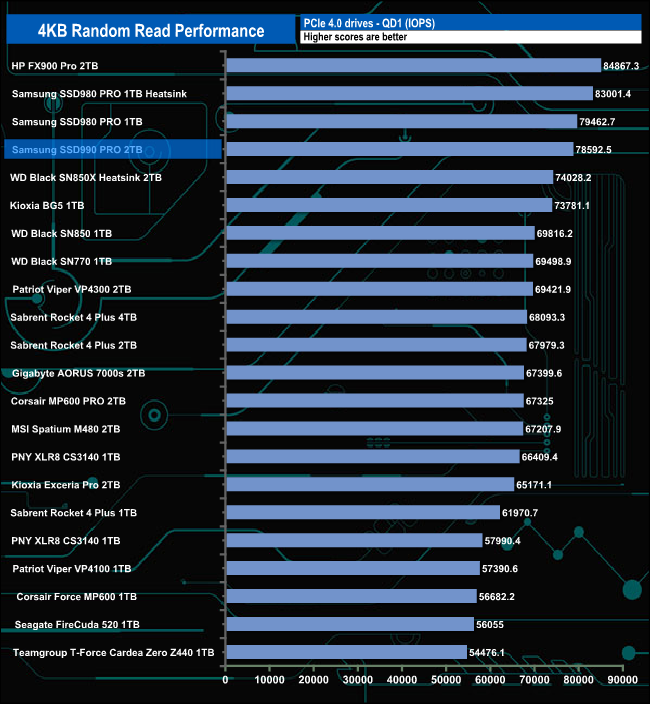
Even though we couldn't get close to the official maximum speeds, the drive is the fastest we've seen to date at QD2. However, as the queue depth deepens the performance drops away.
We used CrystalDiskMark 8‘s custom settings to test the 4K random write performance of the drive through a range of queue depths. The setup for the tests is listed below.
Transfer Request Size: 4KB, Outstanding I/O: 1-32.
The best result we saw from our 4K random write results was 263,972 IOPS at QD16 before the performance dropped back at QD32 at 252,199 IOPS, both of these figures are nowhere near the official maximum.
4K Random Write v QD Performance compared.
At shallower queue depths the drive sits in the top ten in our results chart but as the queue depth deepens the drive drops down the chart, eventually ending up in the bottom ten with the QD32 result of 262,199 IOPS.
We used CrystalDiskMark 8’s custom settings to test the 4K 70/30 mixed read/write performance of the drive through a range of queue depths using a single thread and four threads.
The Samsung 990 Pro has no Problem dealing with our 70/30 read/write tests either with a single thread or four threads. With a single thread, the drive climbs from 24,159.3 IOPS (98.95MB/s) at QD1 up to 111,139 IOPS (455.22MB/s) at QD32.
With four threads the drive goes from 95,179 IOPS (389.57MB/s) at QD1 up to 324,330 IOPS (1,328MB/s) at QD32 but the rate of increase slows from QD8 onwards for both threads.
We used CrystalDiskMark 8 to test the random performance of the drive at lower queue depths (QD1 – QD8 where most of the everyday workloads occur) using 1 to 4 threads.
4K Random Read v QD Performance compared.
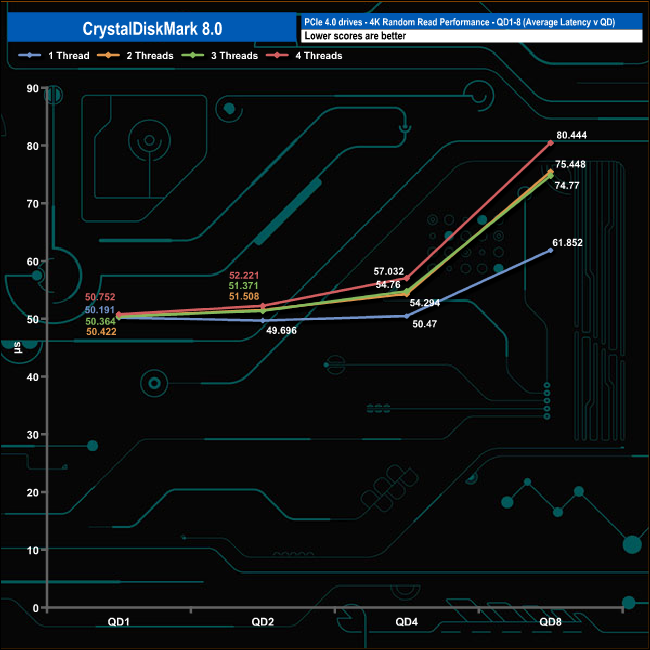
Interestingly Samsung gives two sets of 4K performance figures for the drive. One set is for QD1 with a single thread and the other is for 16 threads at QD32. Taking the official single thread figure of 22,000 IOPS for reads, our best test result of 19,883 IOPS was pretty close.
4K Random Write v QD Performance compared.
While the tested QD1 read figure was not that far off the official maximum, unfortunately, the same can't be said of the QD1 T1 write test result of 56,849 IOPS which is some way off of the official 80,000 IOPS.
In our read-throughput test the drive peaked at the 8MB block mark at 5,443MB/s, quite some way short of the official maximum of 7,450MB/s. However, it was 180MB/s faster than the heatsink version of the previous generation SSD 980 Pro and 283MB/s faster than the standard SSD 980 Pro.
In the write throughput test, the drive peaked at the end of the test with a result of 5,926MB/s. Once again slower than the official maximum but a lot faster than the two models of the previous generation SSD 980 Pro; 1,886MB/s in the case of the heatsink-equipped drive and 1,903MB/s for the standard one.
The PCMark 10 Full System Drive Benchmark uses a wide-ranging set of real-world traces from popular applications and common tasks to fully test the performance of the fastest modern drives. The benchmark is designed to measure the performance of fast system drives using the SATA bus at the low end and devices connected via PCI Express at the high end.
The goal of the benchmark is to show meaningful real-world performance differences between fast storage technologies such as SATA, NVMe, and Intel’s Optane. The Full System Drive Benchmark uses 23 traces, running 3 passes with each trace. It typically takes an hour to run.
Traces used:
Booting Windows 10.
Adobe Acrobat – starting the application until usable.
Adobe Illustrator – starting the application until usable Adobe Premiere Pro – starting the application until usable.
Adobe Photoshop – starting the application until usable.
Battlefield V – starting the game until the main menu.
Call of Duty Black Ops 4 – starting the game until the main menu.
Overwatch – starting the game until main menu.
Using Adobe After Effects.
Using Microsoft Excel.
Using Adobe Illustrator.
Using Adobe InDesign.
Using Microsoft PowerPoint.
Using Adobe Photoshop (heavy use).
Using Adobe Photoshop (light use).
cp1 Copying 4 ISO image files, 20 GB in total, from a secondary drive to the target drive (write test).
cp2 Making a copy of the ISO files (read-write test).
cp3 Copying the ISO to a secondary drive (read test).
cps1Copying 339 JPEG files, 2.37 GB in total, to the target drive (write test).
cps2 Making a copy of the JPEG files (read-write test).
cps3 Copying the JPEG files to another drive (read test).
The best result from the 2TB Samsung 990 Pro in PCMark10’s Full System Drive Benchmark was the 1,072MB/s for the Heavy Use Adobe Photoshop trace. The file transfer tests also Produced a very good cp1 (write test) figure of 4,292MB/s backed up by the 4,175MB/s for the cp3 (read test) and 3,779MB/s for the cp2 read/write test traces.
The 990 Pro is the fastest consumer drive to date we've seen using the PCMark 10 Full System Drive Benchmark. Its overall bandwidth figure of 560MB/s is some 127MB/s and 134MB/s faster than the standard and heatsink-equipped SSD 980 Pro respectively. It's also much quicker when it comes to access speed. At 46μs it's 14μs faster than both versions of the SSD 980 Pro.
The 3DMark Storage Benchmark uses traces recorded from popular games and gaming-related activities to measure real-world gaming performance.
Traces used –
Battlefield V
Loading Battlefield™ V from launch to the main menu.
Call of Duty Black Ops 4
Loading Call of Duty®: Black Ops 4 from launch to the main menu.
Overwatch
Loading Overwatch® from launch to the main menu.
Game Move
Copying the Steam folder for Counter-Strike®: Global Offensive from an external SSD to the system drive.
Game Recording
Recording a 1080p gameplay video at 60 FPS with OBS (Open Broadcaster Software) while playing Overwatch®.
Installing Game
Installing The Outer Worlds® from the Epic Games Launcher.
Game Saving
Saving Progress in The Outer Worlds game.
In 3DMark’s Storage Test, the drive had an average bandwidth figure of 765.91MB/s for the three game load tests (Battlefield V, Call of Duty: Black Ops 4 and Overwatch) with an average access time of 69µs for the same three games. It's the second fastest drive we've seen for these tests but it's the fastest drive when it comes to the game moving, recording, installing and saving suite of tests.
For the long-term performance stability test, we set the drive up to run a 20-minute 4K random test with a 30% write, 70% read split, at a Queue Depth of 256 over the entire disk.
The 2TB Samsung 990 Pro averaged 110,384 IOPS for the test with an excellent performance stability of 98%.
We took note of the drive’s temperature during some of our benchmarking runs. We tested the non-heatsink version of the drive which relies on a combination of a heat spreader label on the back of the drive, nickel plating on the controller and Samsung's Dynamic Thermal Guard technology to keep the drive working at an optimal temperature. This system does work pretty well as the hottest the drive got when being pushed hard during the performance stability test was 54° C which is 16° C off of the maximum operating temperature of 70C. For the bulk of our testing, the temperature averaged around 36° C, well below that maximum temperature.
To test the real-life performance of a drive we use a mix of folder/file types and by using the FastCopy utility (which gives a time as well as MB/s result) we record the performance of drive reading from & writing to a 256GB Samsung SSD850 Pro.
- 100GB data file.
- 60GB iso image.
- 60GB Steam folder – 29,521 files.
- 50GB File folder – 28,523 files.
- 21GB 8K Movie demos.
- 12GB Movie folder – 24 files (mix of Blu-ray and 4K files).
- 11GB 4K Raw Movie Clips (8 MP4V files).
- 10GB Photo folder – 621 files (mix of png, raw and jpeg images).
- 10GB Audio folder – 1,483 files (mix of mp3 and .flac files).
- 5GB (1.5bn pixel) photo.
- Blu-ray movie.
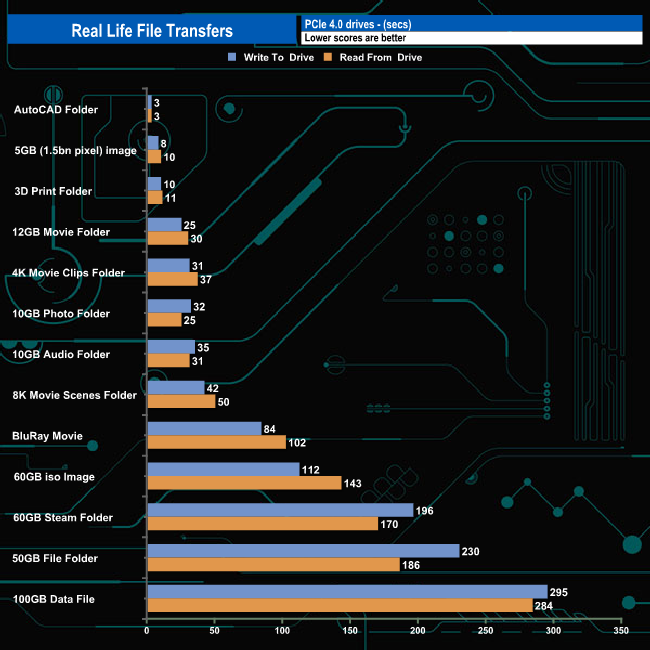
The 990 Pro handled our real-life file transfers without any Problems, particularly when dealing with the larger file size transfers, averaging 545MB/s for writes and 452MB/s for reads when dealing with these file types.
To get a measure of how much faster PCIe NVMe drives are than standard SATA SSDs we use the same files but transfer to and from a 2TB Kioxia Exceria Plus drive:
Writing to and reading from an NVMe drive saw transfer speeds rocket and overall transfer times dropped dramatically. six of the transfers topped over 3GB/s when writing to the drive. Of the remaining seven tests, three topped 2.5GB/s and two topped 1GB/s when writing to the disk. The drive did seem to have a bit of a struggle when reading the 100GB data file, however.
The successor to Samsung's first Gen4 drive, the very popular SSD 980 Pro has now arrived. The 990 Pro brings with it a new controller and Samsung's 7th generation 176-layer 3-bit MLC V-NAND.
Details about the new Pascal controller are very thin on the ground but it is built on an 8nm Process. It uses low-power architecture which Samsung claim improves the SSD’s power efficiency by up to 50% compared to the 980 Pro. It also makes use of hardware automation technology and cache algorithms to optimise the data path from the NAND for improved performance.
At launch the 990 Pro comes in just two capacities; 1TB and 2TB and two versions, with a ‘plain' drive and a low profile heatsink-equipped option. The standard drive, as reviewed here, has a copper heat spreader built into the label while the heatsink version gives more thermal control. A flagship 4TB non-heatsink version is due to be launched sometime in 2023.
With the 990 Pro Samsung has pulled off the neat trick of producing a drive that is not only faster than its predecessor, it also uses less power to do it. The company claim an over 50% improvement in MB/Watt for the 990 Pro over the 980 Pro; 877MB/Watt versus 1,319MB/Watt.
The drive features Samsung's Intelligent TurboWrite 2.0 technology to improve write performance. The default TurboWrite region of the 2TB drive is 10GB but if more is needed up to 216GB can be used as a dynamic SLC to increase the total SLC buffer to 226GB.
Samsung rate the Sequential performance of both models of the drive as up to 7,450MB/s for reads and up to 6,900MB/s for writes. When we tested the drive with the ATTO benchmark, the best we saw from the drive was 6,720MB/s for reads and 6,220MB/s for writes. However, with the CrystalDiskMark benchmark and our own Sequential test, we could confirm the official figures. With CrystalDiskMark we saw a read score of 7,477MB/s and a write score of 6,885MB/s. With our own test, we got very much the same results; 7,485MB/s for reads and 6,884MB/s for writes.
When it came to 4K random performance, we couldn't get anywhere close to the official figures. Samsung quote QD32 (16 threads) figures for the drive of 1,550,000 IOPS and 1,400,000 IOPS for read and writes respectively. With our standard 4-threaded tests the best we saw from the drive was 356,356 IOPS IOPS for reads and 263,972 IOPS for writes.
The 2TB 990 Pro is priced at £283.99. It is not currently listed for sale but it should soon be available directly from Samsung HERE.
Discuss on our Facebook page HERE.
Pros
- Overall performance.
- 5-year warranty.
- AES 256-bit encryption.
- Magician software.
Cons
- Tested 4K performance couldn’t match the official maximum figures.
KitGuru says: Samsung's 990 Pro takes over the mantle of flagship drive from the popular 980 Pro and performs the neat trick of being faster while being more power efficient.
 KitGuru KitGuru.net – Tech News | Hardware News | Hardware Reviews | IOS | Mobile | Gaming | Graphics Cards
KitGuru KitGuru.net – Tech News | Hardware News | Hardware Reviews | IOS | Mobile | Gaming | Graphics Cards


